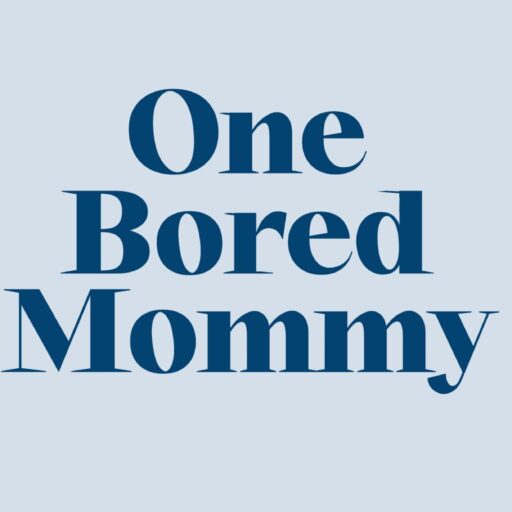Vetted
12 Best Parenting Books for 8-Year-Olds to Help Navigate the Tween Years
Intrigued about navigating the tween years with your 8-year-old? These top parenting books offer practical advice and insights to help you on this journey.

Navigating the tricky tween years with 8-year-olds can be a breeze with the right books. **’Raising Good Humans’** and **’No-Drama Discipline’** share useful tips for *positive parenting*. **’Growing Up Great!’** and **’The Emotions Book’** cover puberty and emotions in an easy-to-understand way. For boys hitting puberty, **’Unlocking The Mysteries Of Boys Puberty’** offers great insights. These books focus on building strong bonds, understanding family life, and encouraging *healthy relationships*. Diving into these reads gives helpful advice for managing the ups and downs of the tween years with your child.
Key Takeaways
- Focus on mindful parenting techniques for navigating the tween years effectively.
- Prioritize evidence-based discipline strategies for positive parent-child relationships.
- Explore puberty resources for open discussions and understanding during this developmental stage.
- Enhance emotional intelligence through books on feelings and empathy for better parent-child bonding.
- Select books offering practical advice on puberty, emotional challenges, and family dynamics for holistic support.
Raising Good Humans: A Mindful Guide to Breaking the Cycle of Reactive Parenting and Raising Kind, Confident Kids

For parents seeking a mindful approach to breaking reactive parenting patterns and fostering kindness and confidence in their 8-year-olds, 'Raising Good Humans' is a valuable resource. This insightful book has garnered positive reviews for its engaging and helpful content. Readers recommend it, especially for first-time parents, highlighting its emphasis on self-work and patience in parenting.
Many have experienced a positive impact on their parenting style, citing the effectiveness of the strategies provided in handling challenging moments with children. While some readers mention challenges in unlearning old habits, the book stresses the importance of self-reflection and mindfulness practices. Personal experiences shared by readers demonstrate how the book aids in identifying triggers and improving parenting skills.
Specific techniques like using 'I' language and win-win discussions, along with mindfulness practices, are highlighted for effective handling of parenting challenges.
Best For: Parents looking to break reactive parenting patterns and cultivate kindness and confidence in their children in a mindful way.
Pros:
- Provides valuable insights and practical strategies for effective parenting.
- Emphasizes self-work and mindfulness practices to improve parenting skills.
- Helps in identifying triggers and handling challenging moments with children.
Cons:
- Some readers may find it challenging to unlearn old habits and implement mindfulness practices.
- Initial approach to mindfulness may feel unapproachable for a few readers.
- Requires dedicated effort and commitment to see significant changes in parenting approach.
No-Drama Discipline: The Whole-Brain Way to Calm the Chaos and Nurture Your Child's Developing Mind
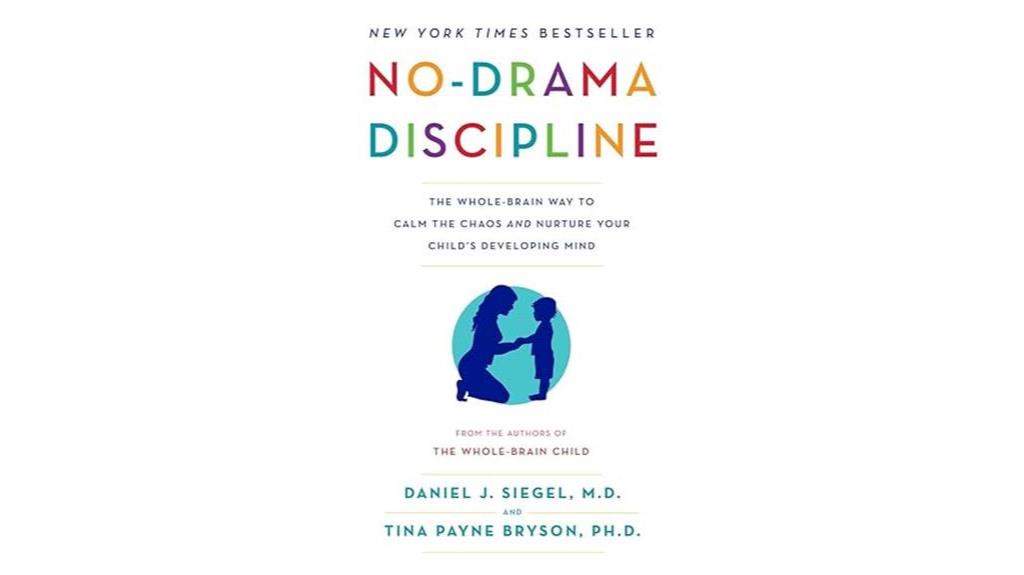
Ideal for parents seeking effective discipline strategies tailored to their 8-year-olds, 'No-Drama Discipline: The Whole-Brain Way to Calm the Chaos and Nurture Your Child's Developing Mind' offers practical tools grounded in modern psychology and brain science.
This book comes highly recommended for parents and caregivers, providing tangible techniques to reshape disciplinary approaches and foster a more harmonious home environment. Readers have reported significant improvements in their parenting skills and their children's behavior after implementing the strategies outlined in the book.
Personal testimonials highlight how 'No-Drama Discipline' equips individuals with insights and methods to navigate challenging situations with their kids successfully. By emphasizing evidence-based strategies and the significance of intentional parenting, this book aids in guiding children towards long-term success.
Its practicality, humor, and adaptability make it a valuable resource for addressing discipline issues and understanding child behavior across various cultural backgrounds worldwide.
Best For: Parents and caregivers seeking evidence-based discipline strategies rooted in modern psychology to effectively guide their 8-year-olds' behavior and nurture their developing minds.
Pros:
- Practical tools grounded in modern psychology and brain science.
- Tangible techniques to reshape disciplinary approaches and create a harmonious home environment.
- Significant improvements in parenting skills and children's behavior reported by readers.
Cons:
- Requires consistent implementation and patience to see long-term results.
- May need adaptation based on individual parenting styles and family dynamics.
- Some readers may find certain strategies challenging to implement in specific situations.
Growing Up Great!: The Ultimate Puberty Book for Boys

This book serves as a valuable resource for parents seeking to navigate conversations about puberty with their 8-year-old sons. 'Growing Up Great!: The Ultimate Puberty Book for Boys' has garnered positive feedback from parents who appreciate its thorough approach to discussing puberty with their sons.
Some parents emphasize the importance of preparing their sons before introducing the book, while a health teacher finds it helpful in opening lines of communication with tween boys. The book covers a wide range of puberty-related topics exhaustively, offering practical advice and an empowering tone for boys entering adolescence.
Boys react positively to the book, finding it informative and engaging, which in turn helps them feel more prepared for the changes and challenges of puberty. Overall, parents recommend this book for boys close to or entering puberty, with some mentioning it as age-appropriate for 10-year-olds.
Best For: Parents looking for a comprehensive and empowering resource to discuss puberty with their pre-teen sons.
Pros:
- Comprehensive coverage of puberty-related topics.
- Practical advice and empowering tone for boys navigating adolescence.
- Helps boys feel more prepared for the changes and challenges of puberty.
Cons:
- Some parents may find it lacking in detail.
- May not meet expectations for younger boys, like 8 or 9-year-olds.
- Requires some preparation before introducing it to sons.
The Emotions Book: A Little Story About Big Emotions (Brave Kids Press)

In exploring parenting books for 8-year-olds, a standout choice emerges in 'The Emotions Book: A Little Story About Big Emotions' by Brave Kids Press. This book is a valuable resource that uses storytelling to help children understand various emotions like happiness, excitement, anger, sadness, and fear.
With engaging illustrations and practical tips on coping with feelings, it fosters emotional intelligence and self-awareness in young readers. Parents find it beneficial as a conversation starter about emotions, promoting open communication and empathy between children and adults.
Children enjoy the compelling characters and illustrations, making it easier for them to grasp complex emotions. 'The Emotions Book' is praised for its educational value, providing a platform for kids to learn about and navigate their feelings with confidence and compassion.
Best For: Parents and educators seeking a valuable resource to help children understand and navigate a wide range of emotions with confidence and compassion.
Pros:
- Engaging storytelling approach to teach various emotions.
- Practical tips provided for coping and expressing feelings.
- Promotes open communication and empathy between children and adults.
Cons:
- Complexity of words used may be challenging for younger children.
- Some parents may find it more suitable for older children.
- Limited focus on certain emotions compared to a broader emotional spectrum.
Unlocking The Mysteries Of Boys Puberty: 7 Facts Every Parent Needs To Know

For parents seeking guidance on understanding and supporting their 8-year-old sons through puberty, 'Unlocking The Mysteries Of Boys Puberty' is a valuable resource that offers essential insights and practical advice. The book by Alexander Woolery covers puberty stages, transformation, and hormone changes, equipping parents with vital information on emotional challenges, personal care, hygiene, nutrition, and recipes.
Woolery's empathetic and practical approach helps parents navigate this critical phase of growth with confidence. The book's straightforward and relatable writing style makes discussing puberty topics easier for parents and encourages open communication with their children.
With a focus on building strong parent-child bonds, nurturing self-esteem, and fostering a supportive environment, 'Unlocking The Mysteries Of Boys Puberty' provides a roadmap for parents to support their sons through the changes they experience during adolescence.
Best For: Parents of 8-year-old sons seeking comprehensive guidance on navigating puberty stages and supporting their children through emotional and physical changes.
Pros:
- Provides essential information on personal care, hygiene, and nutrition during puberty.
- Empathetic and practical approach for parents to confidently support their sons.
- Encourages open communication and bonding between parents and children.
Cons:
- May not address specific medical concerns or conditions related to puberty.
- Focuses primarily on boys' puberty, potentially excluding information relevant to girls.
- Some readers may find the humor used in discussing puberty topics to be inappropriate or distracting.
My Magical Moods – Stop Tantrums and Teach Kids to Regulate Big Feelings and Emotions
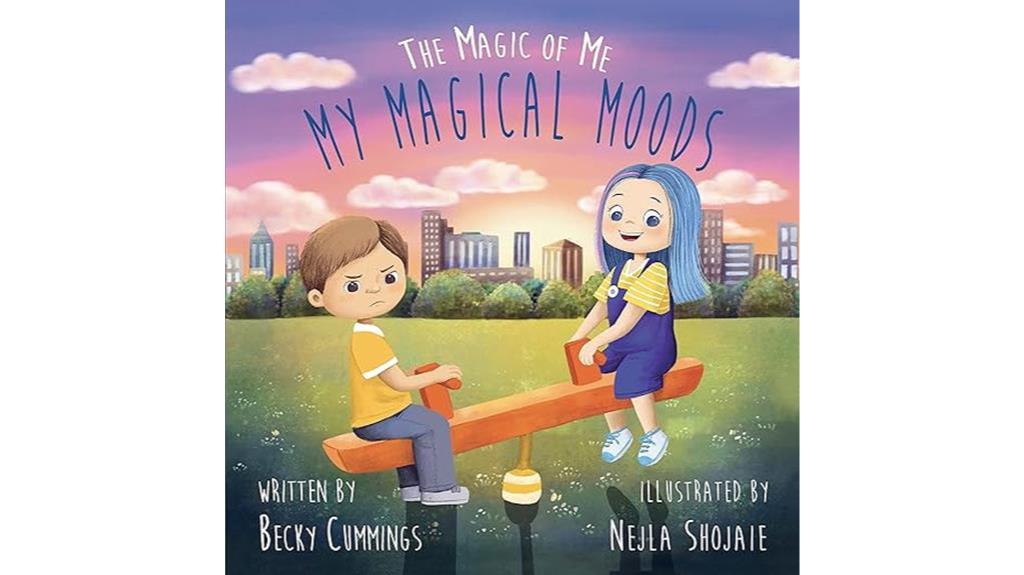
Parents seeking effective strategies to help their 8-year-olds regulate their emotions and handle big feelings should consider 'My Magical Moods'. This book has garnered positive feedback for its focus on empathy, kindness, and emotional regulation. Readers appreciate how it demonstrates that individuals have choices when managing their emotions, making it a valuable resource for schools, daycares, and homes.
Children benefit from learning about different moods and how to navigate them effectively, even being encouraged to take a time out to regroup. 'My Magical Moods' not only helps children improve their emotional well-being but also provides suggestions to turn negative moods into positive ones. Its practicality extends beyond children, proving useful for adults in managing their own emotions.
Overall, this book empowers children to handle their emotions independently and make positive choices.
Best For: Parents looking to help their 8-year-olds regulate their emotions and handle big feelings effectively.
Pros:
- Teaches empathy, kindness, and emotional regulation effectively.
- Encourages children to make positive choices when dealing with their emotions.
- Provides practical suggestions to turn negative moods into positive ones.
Cons:
- May require consistent reinforcement for children to fully adopt the strategies.
- Some children may need additional support to understand and apply the concepts.
- Not all children may resonate with the approach presented in the book.
My Big Girl Potty
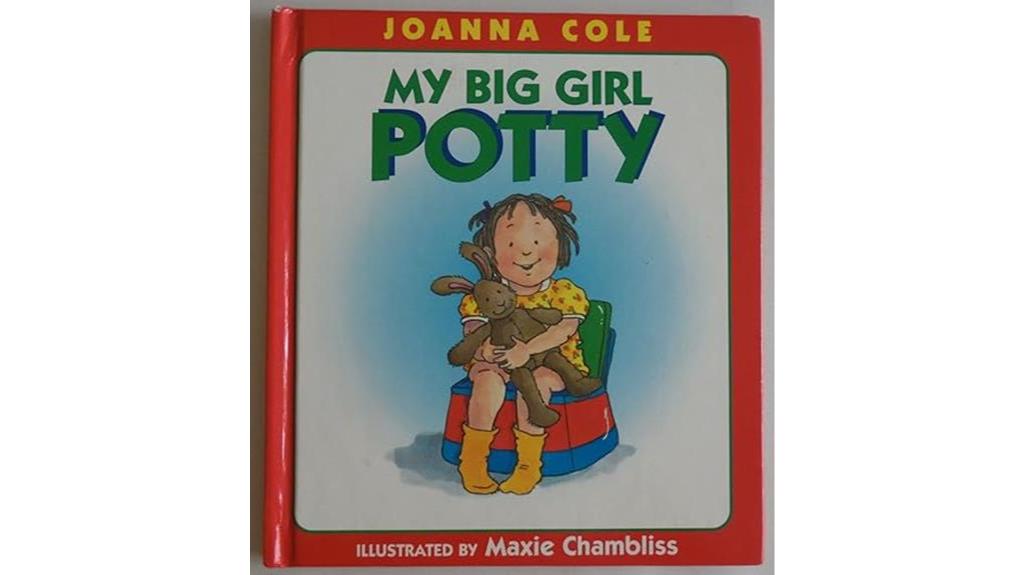
The book 'My Big Girl Potty' engages young girls in their potty training journey with relatable challenges and positive reinforcement. Through the story of Ashley, it involves both parents in the process, emphasizing the role of dads too.
The book tackles realistic scenarios like accidents and gradual progress, offering incentives such as picking out special underwear. Essential steps like washing hands and using the toilet are clearly explained, encouraging children to take pride in their accomplishments.
Recommended by parents for its engaging approach, the book stands out with its interactive elements, prompting questions about the child while narrating Ashley's experiences. Compared favorably with other potty training books, 'My Big Girl Potty' motivates children towards successful potty training, making it a valuable resource for families starting on this important milestone.
Best For: Parents looking for an engaging and relatable potty training book for young girls.
Pros:
- Engages both parents in the potty training process.
- Includes realistic challenges and gradual progress.
- Encourages children to take pride in their accomplishments.
Cons:
- Some cultural and language differences may require adaptations for understanding.
- Limited focus on the role of dads in the potty training journey.
- May not appeal as strongly to boys due to the specific focus on a girl protagonist.
My Grandpa is NOT Grumpy: Funny Rhyming Picture Book for Beginner Readers 2-8 years

When selecting a book for an 8-year-old, consider 'My Grandpa is NOT Grumpy' as a delightful choice that celebrates the bond between grandchildren and their grandparents. This book, written by Kally Mayer, has received positive reviews for its cute and funny story that resonates with young readers.
The illustrations and humor in the book are particularly praised, making it an engaging read for beginner readers aged 2-8 years. Many readers have found personal connections to the story, relating their own experiences with their grandfathers.
While some reviewers have expressed mixed feelings about certain aspects of the book, overall, 'My Grandpa is NOT Grumpy' is commended for its quality, relatability, and the message of love it conveys between grandparents and grandchildren.
Best For: Parents looking for a heartwarming and humorous book to share with their children and celebrate the special bond between grandparents and grandchildren.
Pros:
- Cute and funny story that resonates with young readers.
- Engaging illustrations that enhance the reading experience.
- Highlights the love and connection between grandparents and grandchildren.
Cons:
- Some concerns about certain words and graphic content not being suitable for young children.
- Mixed feelings expressed by some reviewers regarding the book's content.
- Some find the choice of topics and illustrations weird or inappropriate for toddlers and preschoolers.
I Love My Daddy: A Story of Unconditional Love for Children Ages 1-6

For 8-year-olds seeking heartwarming tales of family bonds, 'I Love My Daddy: A Story of Unconditional Love' is a touching choice. This book has garnered positive reviews for its adorable storyline and beautiful illustrations. Parents have praised it as a perfect gift for new dads, with some mentioning that the story still brings tears to their eyes.
The book's large hardcover format and reasonable price point have also been highlighted as appealing features. Readers have expressed satisfaction with the message of love and the enjoyment it brings to both children and fathers. Overall, 'I Love My Daddy' seems to strike a chord with families, making it a recommended read for young children aged 1-6.
Best For: Families with young children aged 1-6 looking for a heartwarming tale of unconditional love between a father and child.
Pros:
- Adorable storyline that resonates with both children and fathers.
- Beautiful and creative illustrations that capture the essence of the story.
- Reasonable price for a large hardcover book, making it a great gift option for new dads.
Cons:
- Might not be engaging for older children above the age of 6.
- Limited age range appeal, specifically targeted towards younger children.
- Some readers may find the storyline overly sentimental.
Dont Feed The WorryBug: A Book about Worry (The WorryWoos)

Recommended for children between 4 and 7 years old, this book on worry, 'Dont Feed The WorryBug: A Book about Worry (The WorryWoos),' offers a heartwarming story with helpful coping skills and activities. The book's positive reviews highlight its relatability for both kids and adults, bringing peace and aiding in understanding worry.
With detailed and adorable illustrations, it's praised for explaining anxiety effectively to young children. While some negative feedback mentions that older kids mightn't engage as well, overall, the book is seen as a valuable tool for understanding and addressing emotions. It includes practical coping mechanisms and activities, making it suitable for children dealing with anxiety.
Whether purchased for personal use or in professional settings, 'Dont Feed The WorryBug' is viewed as a well-written, impactful resource for teaching children about worry and anxiety.
Best For: Parents and professionals looking to help children aged 4-7 understand and cope with worry and anxiety.
Pros:
- Cute and relatable for kids and adults.
- Contains helpful coping skills and activities.
- Great for explaining anxiety to young children.
Cons:
- May not engage older kids effectively.
- Some children may not relate well to the book.
- Not as effective for children dealing with health-related anxiety.
Discipline Like a Pro: Parenting Guide for Toddler to 8 years
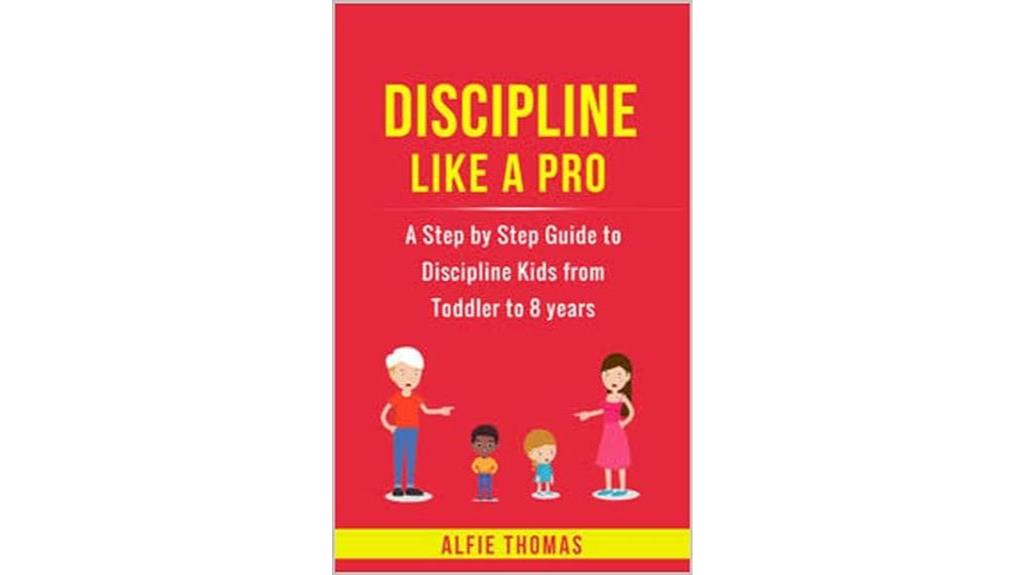
With practical advice and a focus on nurturing relationships, 'Discipline Like a Pro' is a must-have guide for parents of toddlers to 8-year-olds. The book equips parents with tools to establish healthy discipline practices, emphasizing the importance of proper discipline in raising well-rounded individuals.
Readers appreciate the guidance on giving positive feedback, practicing gentle discipline, and setting boundaries without impacting a child's self-esteem. This resource offers insights into different discipline styles and provides valuable advice on reacting to children's behavior effectively.
By following the strategies outlined in the book, parents can foster a compassionate and understanding relationship with their children while avoiding power struggles. 'Discipline Like a Pro' is recommended for modern parents seeking to enhance their parenting skills and develop a thoughtful approach to discipline.
Best For: Parents of toddlers to 8-year-olds seeking practical guidance on nurturing relationships and effective discipline techniques.
Pros:
- Provides practical advice and tools for establishing healthy discipline practices.
- Emphasizes the importance of positive feedback and gentle discipline.
- Offers insights into different discipline styles and effective ways to react to children's behavior.
Cons:
- May require consistent effort and practice to implement the strategies effectively.
- Some parents may find certain disciplinary techniques challenging to apply in real-life situations.
- The book's focus on nurturing relationships may not resonate with parents who prefer a stricter disciplinary approach.
The Worlds Best Dad: A fill-in keepsake from me, to you, for us (Volume 2)

Ideal for 8-year-olds seeking a heartfelt gift for their fathers, 'The Worlds Best Dad: A fill-in keepsake from me, to you, for us (Volume 2)' offers a beautifully designed and durable option for expressing appreciation and creating lasting memories.
With thick pages, a high-end cover, and sturdy binding, this hardcover book guarantees a polished look that withstands the test of time. Tailored for kids, it presents prompts covering various aspects of gratitude and shared experiences, allowing children to articulate why their dad is special and reminisce about cherished moments.
Recommended for kids as young as 2 years old, this book provides engaging activities like writing, drawing, and memory recall. While some users find it challenging for younger children, gradual progress can make it more manageable.
Despite minor criticisms like repetitive prompts and limited personalization space, this keepsake is praised for its thoughtful prompts and lasting sentiment it offers as a gift for dads.
Best For: Ideal for children aged 2 to 8 looking to create a heartfelt gift for their fathers.
Pros:
- Thoughtful prompts that encourage appreciation and gratitude towards dads.
- Durable construction with thick pages, high-end cover, and sturdy binding.
- Provides engaging activities like writing, drawing, and memory recall for kids.
Cons:
- Some prompts may feel repetitive for users.
- Limited blank spaces for personalization.
- Younger children might find the book daunting initially.
Factors to Consider When Choosing Parenting Books for 8 Year Olds

When selecting parenting books for 8-year-olds, it's vital to take into account factors like age-appropriate content, practical parenting tips, child development insights, interactive activities, and fostering positive parent-child bonding.
These elements are important for providing relevant information tailored to your child's age and developmental stage, enhancing your parenting skills, understanding your child's growth, engaging them through interactive exercises, and strengthening your relationship with them.
Age-Appropriate Content
Consider the cognitive and emotional development of 8-year-olds when selecting parenting books for this age group. Look for books that are engaging and relevant to their level of understanding. Choose literature that addresses common challenges or milestones kids face at this age.
Opt for content that promotes independence, critical thinking, and social skills suitable for 8-year-olds. Make sure the language and concepts used in the books align with their comprehension level. It's vital to select materials that resonate with their interests and experiences to keep them interested and invested in the lessons.
Practical Parenting Tips
To select the most beneficial parenting books for 8-year-olds, prioritize practical tips that address specific challenges parents commonly encounter at this developmental stage. Look for books that offer strategies on handling issues like discipline, communication, and fostering independence tailored to your child's age.
Consider resources that focus on nurturing emotional intelligence, problem-solving skills, and resilience to support your 8-year-old effectively. Choose books that emphasize building a positive parent-child relationship based on mutual respect and understanding, essential for maneuvering the unique dynamics of parenting a child in this age group.
Seek out advice on school performance, peer relationships, and self-esteem that's age-appropriate and supportive of your child's growth. Opt for books that highlight active listening, effective communication, and setting boundaries as essential tools for guiding your 8-year-old through their formative years successfully.
Child Development Insights
Understanding the cognitive development of 8-year-olds is essential in selecting appropriate parenting books for this age group. At this stage, children are expanding their logical thinking abilities, problem-solving skills, and understanding of cause and effect relationships.
When choosing parenting books for 8-year-olds, it's vital to take into account emotional and social development milestones. Look for books that can support children in navigating friendships, managing emotions, and building empathy. Additionally, selecting books that address physical changes and health concerns typical for 8-year-olds can provide valuable information for parents.
Furthermore, consider books that focus on fostering independence, responsibility, and decision-making skills in children at this stage. Parenting books that offer strategies for handling challenges like peer relationships, school stress, and developing self-esteem in 8-year-olds can be particularly advantageous.
Interactive Activities Included
In addition to incorporating interactive activities in parenting books to engage your 8-year-old and enhance their learning experience, these activities, such as journal prompts, drawing exercises, and reflection questions, can help your child express their thoughts, emotions, and experiences in a creative and engaging way.
By including interactive elements in books, parents can strengthen the bond with their child by encouraging open communication and shared experiences. Additionally, these activities make learning about emotions, behavior, and relationships more fun and memorable for children.
When selecting a parenting book for your 8-year-old, consider the balance between informative content and interactive exercises. A good mix of both can keep your child interested and actively involved in the learning process. Interactive activities not only make the content more engaging but also provide practical ways for children to apply what they're learning.
Positive Parent-Child Bonding
Considering the significance of positive parent-child bonding, it's vital to select parenting books for 8-year-olds that emphasize interactive discussions and reflection to enhance the relationship.
Strengthening the bond between parents and children is essential for promoting emotional well-being and resilience in kids. Engaging in shared activities like reading from parenting books can foster communication, empathy, and trust.
Opting for books that encourage interactive discussions and reflection can greatly improve the parent-child relationship. By focusing on positive reinforcement and connection strategies, these books can help build a solid foundation for a healthy bond between parents and 8-year-olds.
Hence, when choosing parenting books for this age group, it's crucial to consider how the content promotes interaction, communication, and reflection to nurture a positive and supportive relationship between parent and child.
Impact on Family Dynamics
Selecting parenting books for 8-year-olds involves considering their potential impact on family dynamics, emphasizing guidance on fostering healthy relationships and effective communication. These books can play an important role in shaping family interactions by offering strategies for managing conflicts, promoting empathy, and encouraging positive communication within the household.
By providing insights into children's developmental stages, these resources help parents tailor their approach to support their child's emotional and cognitive growth effectively. Practical advice and solutions to common challenges presented in these books contribute to creating a harmonious and supportive family environment.
Choosing the right parenting books for 8-year-olds can lead to improved family dynamics, enhanced understanding between parents and children, and an overall boost in the well-being of the entire family unit. It's essential to select books that align with your family values and goals, as their influence can have a lasting impact on the relationships and dynamics within your household.
Frequently Asked Questions
How Can I Help My 8-Year-Old Make Friends and Socialize Better?
To help my 8-year-old make friends and socialize better, I encourage open communication about feelings and experiences. Organizing playdates or joining group activities can boost social skills.
Teaching empathy and kindness fosters positive interactions. Role-playing scenarios can help practice social situations. Setting up a routine for socializing helps create consistency.
Acknowledging and celebrating small social victories builds confidence. Providing a safe space to express worries or fears about socializing is essential for support.
Are There Specific Strategies for Dealing With Sibling Rivalry at This Age?
Dealing with sibling rivalry at this age involves setting clear expectations, encouraging positive communication, and teaching conflict resolution skills.
Implementing fair consequences for negative behavior and fostering individual relationships can also help.
Creating opportunities for shared activities can promote bonding and reduce competition.
It's essential to address conflicts promptly and calmly, emphasizing empathy and understanding.
What Are Some Tips for Addressing Body Image Issues in 8-Year-Olds?
When addressing body image issues in 8-year-olds, it's essential to foster a positive self-image. Encourage discussions about feelings and emotions, emphasizing that beauty comes in all shapes and sizes.
Promote healthy habits like balanced nutrition and regular exercise for overall well-being. Avoid making negative comments about your own body or others'.
How Can I Support My Child Through Academic Challenges and School Stress?
When my child faces academic challenges and school stress, I focus on open communication, offering support without pressure. By understanding their struggles, I can tailor assistance to their needs.
We establish a routine, create a quiet study space, and set achievable goals together. Encouraging breaks, physical activity, and relaxation techniques helps manage stress.
Celebrating small victories and showing empathy are essential in fostering resilience and a positive attitude towards learning.
Are There Resources for Addressing Technology and Screen Time Boundaries With My Child?
When it comes to managing technology and screen time boundaries with my child, I rely on open communication and clear guidelines. Setting specific limits on daily screen time and designating tech-free zones in the house helps maintain balance.
I also make an effort to engage in screen-free activities together, fostering quality time and bonding. Regularly discussing the importance of moderation and responsible tech use reinforces these boundaries.
Consistency and flexibility are key in handling this aspect of parenting.
Are Parenting Books for 10 Year Olds Also Helpful for Navigating the Tween Years for 8-Year-Olds?
When it comes to navigating the tween years, the best parenting books for 10 year olds can still be helpful for 8-year-olds. These books often cover a range of topics including communication, emotional development, and setting boundaries, which can be beneficial for children as they enter the tween years.
Conclusion
To sum up, these parenting books for 8-year-olds offer practical advice and guidance to help navigate the tween years with ease.
By exploring topics such as discipline, emotions, and puberty, parents can gain valuable insights to support their child's development.
With the right tools and knowledge, raising a kind, confident, and resilient child becomes a more manageable and rewarding journey.
So, why not give these books a try and see the positive impact they can have on your parenting journey?
Vetted
15 Best Books to Read on Parenting – Expert Recommendations for New and Experienced Parents
Keen on enhancing your parenting skills? Discover expert-recommended books that offer invaluable insights and practical advice for new and experienced parents.

Looking for the **best parenting advice**? These books cater to both new and seasoned parents. ‘Raising Good Humans’ touches on mindful parenting. ‘1-2-3 Magic’ shares clever ways to handle discipline. ‘The Happiest Toddler on the Block’ manages tantrums with ease. ‘Teach Your Child to Read in 100 Easy Lessons’ provides a step-by-step approach to learning. ‘The Happiest Baby on the Block’ soothes infants effectively. Got a child with ADHD? ‘Beginners Guide on Parenting Children with ADHD’ handles challenging moments. ‘Strong Mothers, Strong Sons’ delves into the mother-son bond. ‘Mamas Don’t Let Your Babies Grow Up To Be A-Holes’ is vital for nurturing kind-hearted kids. Each book offers a wealth of knowledge waiting to be tapped into.
Key Takeaways
- "Raising Good Humans" for mindful parenting and breaking reactive cycles.
- "1-2-3 Magic" offers gentle discipline techniques and effective boundaries.
- "The Happiest Toddler on the Block" guides on managing tantrums with empathy.
- "Teach Your Child to Read in 100 Easy Lessons" for structured reading methods.
- "Strong Mothers, Strong Sons" gives insights into raising extraordinary men.
Raising Good Humans: Mindful Guide to Breaking Cycle of Reactive Parenting & Raising Kind, Confident Kids
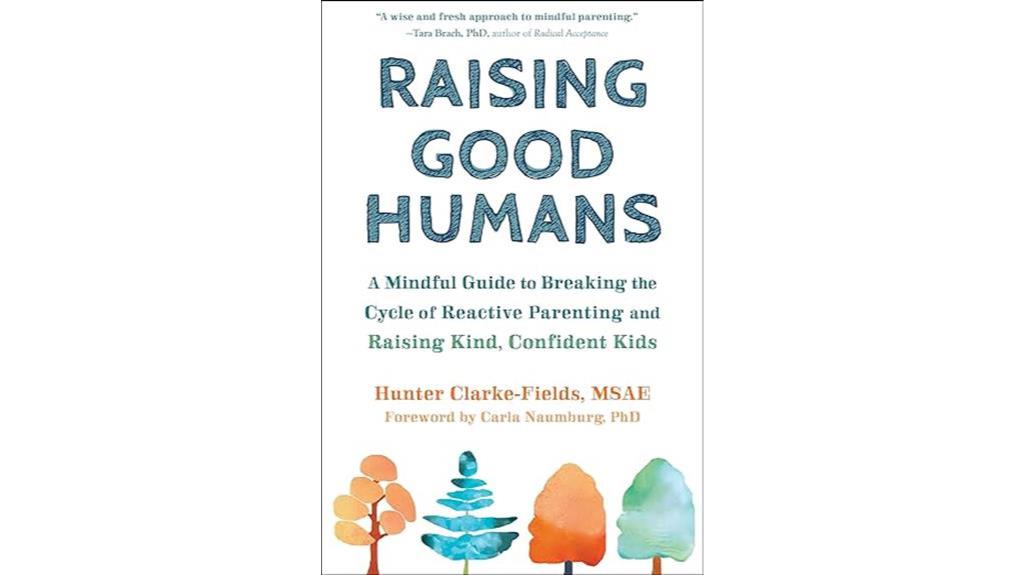
If you're seeking a transformative approach to parenting that prioritizes mindfulness and breaking reactive patterns, 'Raising Good Humans' is the ideal choice for cultivating kind, confident kids. This book has garnered positive reviews and recommendations for its insightful and engaging content. Readers praise its effectiveness in changing parenting approaches, particularly in handling challenging moments with children.
While some readers find unlearning their upbringing a challenge, the emphasis on self-work and mindfulness practices proves beneficial in enhancing parenting skills. Personal experiences shared by readers highlight the book's impact on identifying triggers and improving self-reflection.
Specific techniques such as I language and win-win discussions are mentioned, underlining the importance of mindfulness, meditation, and self-focus in effectively maneuvering the complexities of parenting.
Best For: Parents seeking a transformative and mindful approach to breaking reactive parenting patterns and raising kind, confident kids.
Pros:
- Insightful and engaging content.
- Effective in changing parenting approaches.
- Helps in handling challenging moments with children.
Cons:
- Some readers may find unlearning their upbringing a challenge.
- Initial difficulty with mindfulness practices for a few readers.
- Requires a commitment to self-work and mindfulness practices.
Teach Your Child to Read in 100 Easy Lessons: Revised and Updated Second Edition
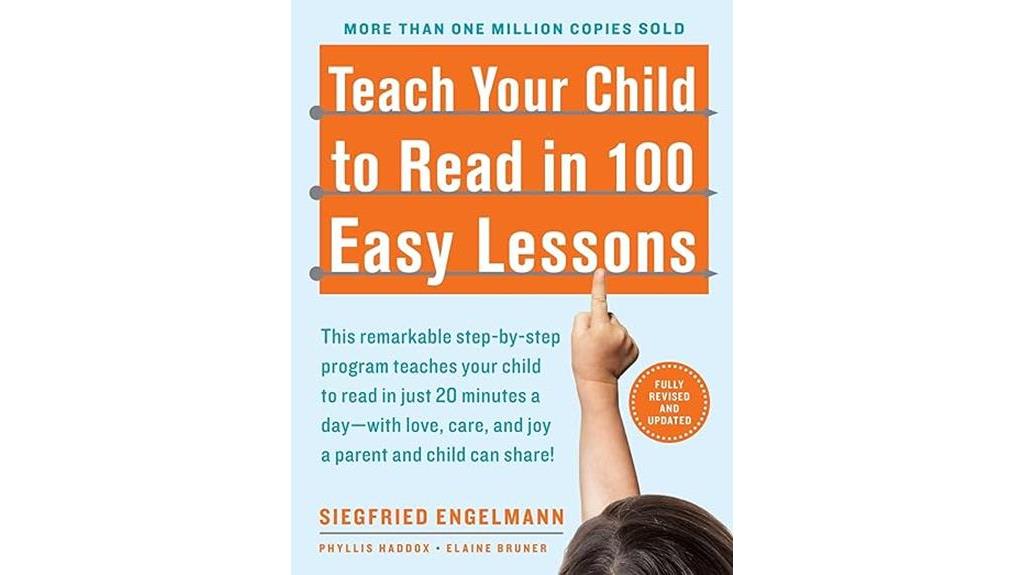
Among the multitude of books on parenting, Teach Your Child to Read in 100 Easy Lessons: Revised and Updated Second Edition stands out as an invaluable resource for parents looking to empower their children with essential reading skills. This book offers specific instructions on teaching methods, correcting mistakes, and pronunciation, with success hinging on the parent's effectiveness.
Children progress noticeably by Lesson 20, learning to sound out words without pauses. Lessons are quick, lasting 10-15 minutes, once familiar. The method, though repetitive, proves effective, helping children go from not reading to confidently reading multiple words.
Parents find value in additional reading materials like BOB Books that complement the lessons. Teaching a child to read becomes an educational journey for both parent and child, emphasizing patience, consistency, and adapting to the child's pace.
Best For: Parents seeking a structured and effective method to teach their children how to read at an early age.
Pros:
- Structured and specific instructions for teaching reading methods.
- Significant progress noticeable by Lesson 20.
- Quick and manageable lessons of 10-15 minutes.
Cons:
- Repetitive techniques may not suit all children's learning styles.
- Success heavily reliant on the parent's teaching effectiveness.
- Requires consistent daily practice and commitment from both parent and child.
Beginners Guide on Parenting Children with ADHD: Modern Approach for Your Hyperactive Child
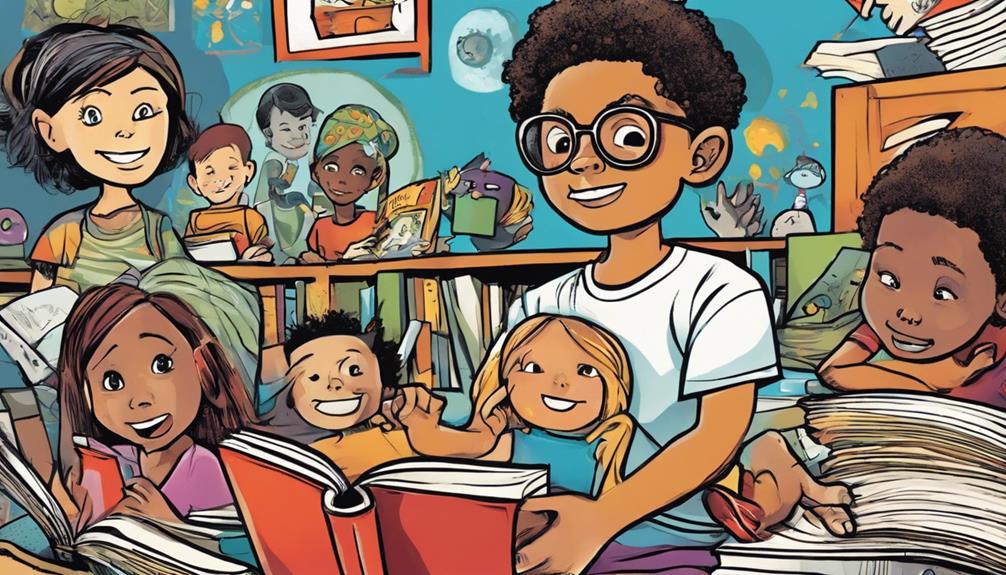
For parents seeking a modern and concise approach to understanding and supporting hyperactive children with ADHD, the 'Beginners Guide on Parenting Children with ADHD' is a valuable resource. This book has received positive reviews for addressing ADHD in children effectively and providing a fresh perspective on managing the condition.
It's praised for being clear, concise, and suitable for beginners, making it an accessible read for parents looking to navigate the challenges of raising a child with ADHD. While some critics mention a lack of concrete suggestions and evidence-based strategies, many readers find the therapy methods described in the book to be helpful in guiding ADHD children and fostering a loving environment within the family.
Published in 2021, this book offers up-to-date information compared to older resources, making it a relevant choice for parents looking to support their hyperactive child.
Best For: Parents looking for a clear and concise introductory guide on parenting children with ADHD, focusing on a modern approach.
Pros:
- Addresses ADHD effectively and provides a fresh perspective on managing the condition.
- Clear, concise, and suitable for beginners, making it an accessible read.
- Therapy methods described in the book are helpful in guiding ADHD children and fostering a loving environment within the family.
Cons:
- Lacks concrete suggestions and evidence-based strategies.
- Some readers may find it upsetting to refer to ADHD as an illness.
- Needs more practical advice on what to do instead of what not to do.
1-2-3 Magic: Gentle 3-Step Child & Toddler Discipline for Calm, Effective, and Happy Parenting
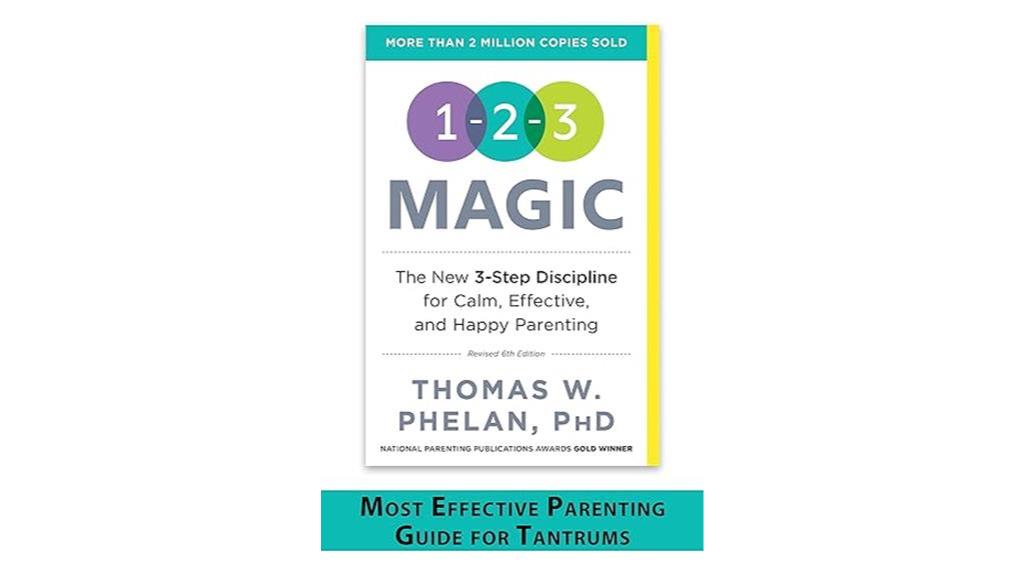
Who'd benefit most from 'Books on Parenting: 1-2-3 Magic: Gentle 3-Step Child & Toddler Discipline for Calm, Effective, and Happy Parenting'?
This book is ideal for parents seeking a structured yet gentle approach to discipline that promotes calm and effective parenting. It caters to those looking for practical techniques to manage children's behavior with simplicity and consistency.
The 1-2-3 Magic method emphasizes setting clear boundaries, using 'if/then' statements, and staying composed during challenging moments. Parents who value communication, boundaries, and positive family dynamics will find this book insightful.
Additionally, caregivers of children with special needs, such as ADHD or autism, can benefit from adapting the method to suit their unique circumstances.
Overall, this book offers valuable strategies for enhancing parenting skills and fostering a harmonious parent-child relationship.
Best For: Parents seeking a structured yet gentle approach to discipline that promotes calm and effective parenting, emphasizing clear boundaries and consistency.
Pros:
- Offers practical techniques for managing children's behavior with simplicity.
- Emphasizes the importance of setting clear boundaries and using 'if/then' statements.
- Provides insights on staying composed during challenging parenting moments.
Cons:
- May require consistent effort and practice to effectively implement the method.
- Some parents may find it challenging to remain calm in high-stress situations.
- The approach may not resonate with all parenting styles or philosophies.
The Happiest Baby on the Block: Fully Revised and Updated Second Edition
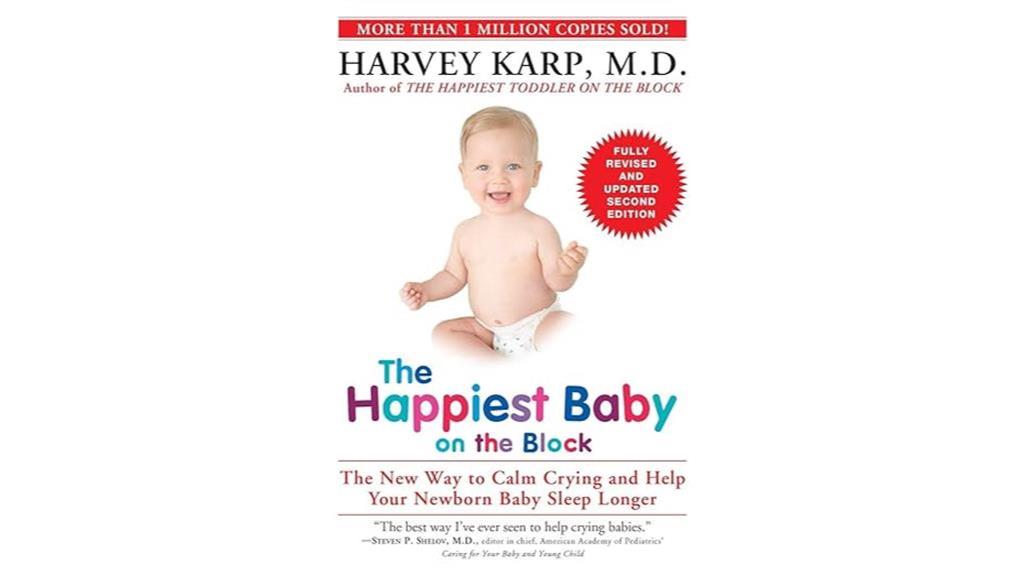
The Happiest Baby on the Block: Fully Revised and Updated Second Edition is an essential resource for calming fussy infants and providing practical guidance for new parents. Dr. Karp's approach, introducing the 5 Ss to recreate a comforting womb-like environment, has been a game-changer for many parents.
The book's step-by-step instructions and insights into newborn behavior offer a compassionate toolkit for soothing babies effectively. Personal experiences shared by readers highlight the book's impact in easing anxieties and providing valuable advice.
While some find the content slightly repetitive, the book's effectiveness in calming babies is widely acknowledged. It empowers parents by offering knowledge and skills to navigate the early days of parenthood with confidence.
Overall, the book is recommended for its practical teachings and empathetic approach to soothing newborns.
Best For: New parents seeking a compassionate and proven approach to soothing fussy infants.
Pros:
- Practical tips and step-by-step instructions for calming babies effectively.
- Empowering parents through the early days of parenthood with valuable knowledge and skills.
- Insights into newborn behavior and creating a comforting environment akin to the womb.
Cons:
- Some readers find the content slightly repetitive.
- Lack of detailed information on putting babies to sleep and maintaining their sleep.
- While effective in soothing babies, could be more concise in its presentation.
Mamas Dont Let Your Babies Grow Up To Be A-Holes: Unfiltered Advice on How to Raise Awesome Kids
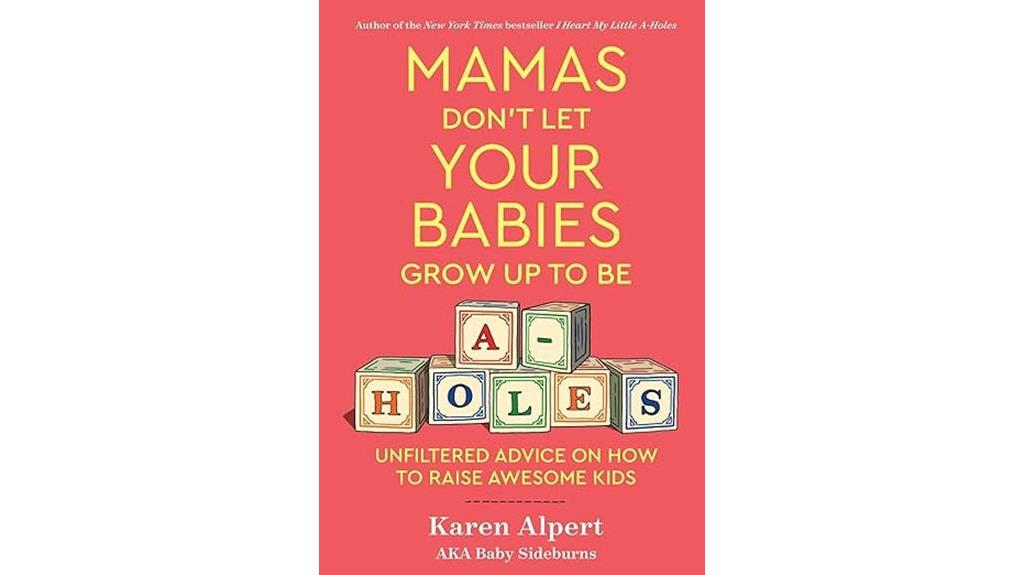
A go-to for parents seeking unfiltered advice on raising awesome kids is the book 'Mamas Dont Let Your Babies Grow Up To Be A-Holes.' This book has garnered love and admiration from readers for its humor, relatability, and authenticity.
It offers engaging and compelling insights into parenting, emphasizing the importance of not raising 'a-holes.' The author encourages parents to be kind to themselves, allow children to make mistakes, and shares relatable stories and tips for well-adjusted kids.
With a diverse audience ranging from young parents to empty nesters, the book resonates with readers of various ages. While some find the humor slightly forced, many appreciate the wisdom and experiences shared, describing it as a must-buy for those seeking laughter and valuable parenting lessons.
Best For: Parents and individuals seeking humorous yet insightful advice on raising children in a relatable and authentic manner.
Pros:
- Offers unfiltered and engaging parenting advice.
- Emphasizes the importance of self-compassion and allowing children to make mistakes.
- Provides relatable stories and practical tips for raising well-adjusted kids.
Cons:
- Some readers may find the humor slightly forced.
- Not suitable for those looking for a more traditional parenting guide.
- May not appeal to individuals who prefer a serious tone in parenting advice.
The Happiest Toddler on the Block: How to Eliminate Tantrums and Raise a Patient, Respectful and Cooperative One- to Four-Year-Old: Revised Edition
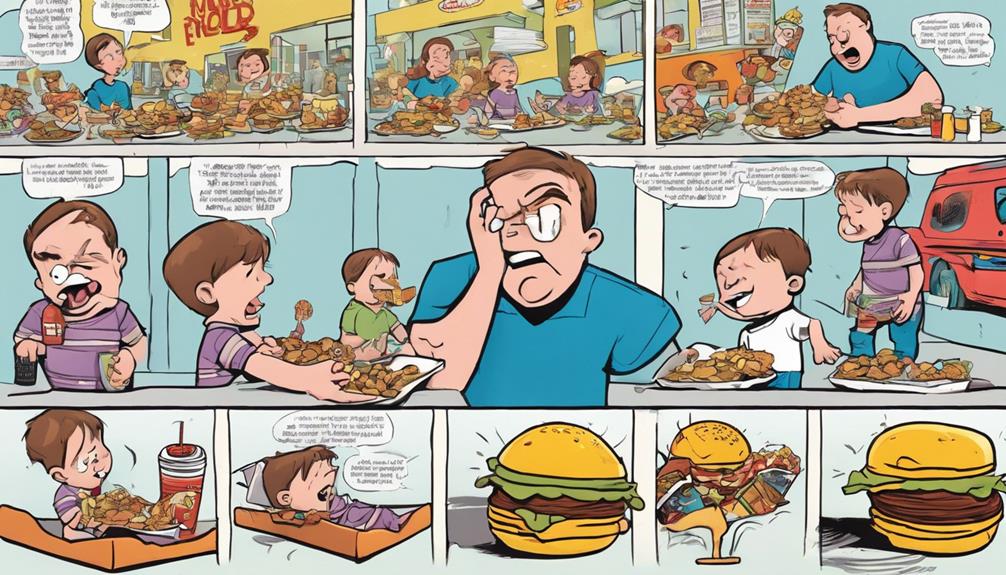
Recommended for parents seeking effective strategies to handle tantrums and improve behavior in their one- to four-year-old children, 'The Happiest Toddler on the Block: How to Eliminate Tantrums and Raise a Patient, Respectful, and Cooperative One- to Four-Year-Old: Revised Edition' offers practical and insightful guidance.
This book, written by an author who comprehends children well, is praised for its non-judgmental approach towards parents and their little ones. It provides direct and concise methods that have proven to be effective in real-life situations.
By delving into toddlers' thought processes and validating their emotions, the book equips parents with tools to mirror and manage their child's feelings constructively. It emphasizes understanding over distraction, empowering parents to navigate tantrums with empathy and communication.
Highly recommended by parents worldwide, this book stands out for its ability to foster personal growth and enhance parent-child interactions through its straightforward yet powerful strategies.
Best For: Parents seeking effective strategies to handle tantrums and improve behavior in their one- to four-year-old children.
Pros:
- Written by an author who understands children well.
- Non-judgmental approach towards parents and their children.
- Direct and concise methods that are effective in real-life situations.
Cons:
- Repetitive content may be present in the book.
- Some readers might find the content too straightforward.
- The book's focus on toddlers aged 1-4 limits its applicability to older children.
Moms on Call | Basic Baby Care 0-6 Months | Parenting Book 1 of 3
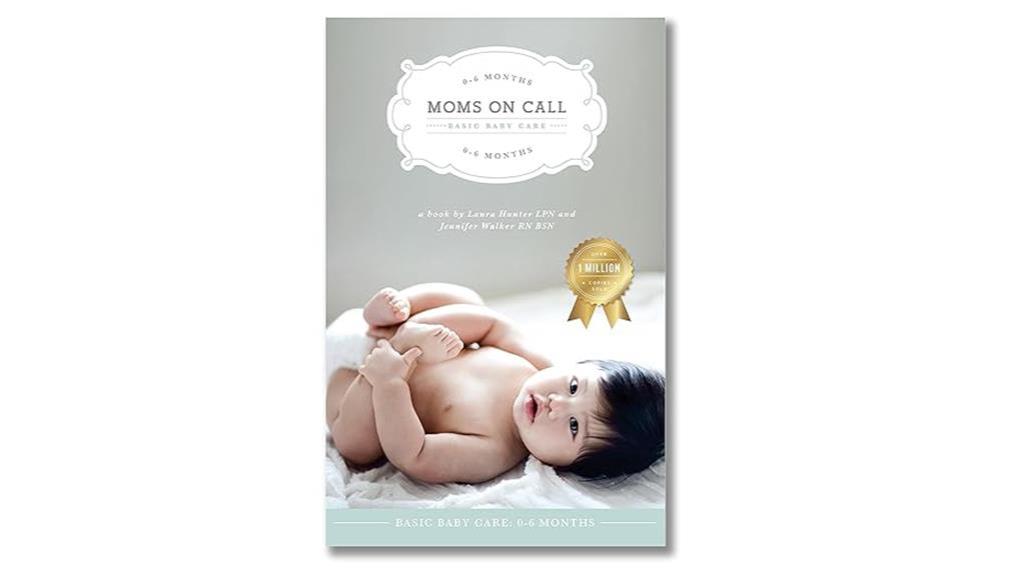
Ideal for first-time parents seeking practical guidance on baby care and establishing routines, Moms on Call is a thorough resource. This detailed parenting book offers clear instructions on baby care, schedules, sleep training, and introducing solid foods.
It's praised for its concise and easy-to-read format, providing step-by-step guidance for new parents. Users appreciate its effectiveness in establishing routines and improving baby sleep patterns. While some find the book slightly overpriced for its content, it receives recommendations from friends, family, and online parenting communities.
Parents share positive experiences with implementing the book's recommendations, especially regarding sleep training and routines. The book's global impact is evident through multilingual feedback, with users worldwide expressing gratitude for its guidance in baby care and sleep training.
Best For: First-time parents looking for practical guidance on baby care, sleep training, and establishing routines.
Pros:
- Clear instructions on baby care, schedules, sleep training, and introducing solid foods.
- Concise and easy-to-read format with step-by-step guidance for new parents.
- Effectiveness in helping establish routines and improving baby sleep patterns.
Cons:
- Some users find the book slightly overpriced for its content and size.
- Mixed reviews regarding certain methods suggested, such as cry-out methods.
- Caution advised in following all recommendations; users suggest picking and choosing what works best for individual families.
The 5 Principles of Parenting: Your Essential Guide to Raising Good Humans
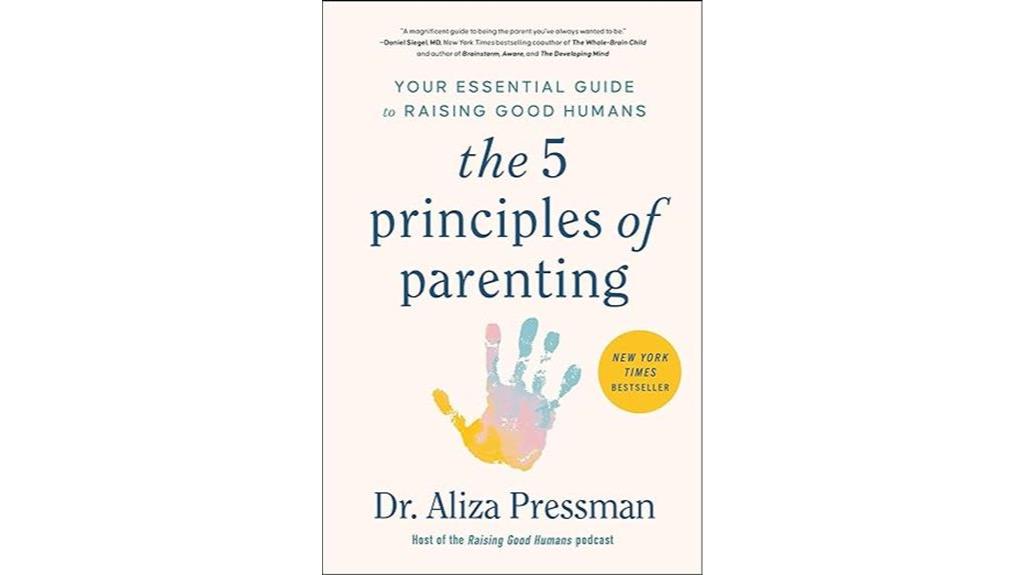
The 5 Principles of Parenting in 'Books on Parenting' offer an essential guide for those seeking practical and expert advice on raising good humans. Dr. Pressman's principles – Relationship, Reflection, Regulation, Rules, and Repair – provide a structured approach to nurturing children effectively. Positive reviews highlight the praise for Dr. Pressman's work and Dr. Aliza's research-backed guidance, emphasizing the book's approachability and practicality.
This framework influences parenting by encouraging self-reflection, offering tools for emotional regulation, and providing expert insights into understanding children better. Parental feedback shows excitement and high recommendations for the book, noting its impact on perspectives and practices. Dr. Aliza's expertise as an educator and influencer through podcasts and books further solidifies the value of these principles for parents seeking to raise good humans.
Best For: Parents seeking a structured and practical approach to nurturing children effectively.
Pros:
- Structured approach with clear principles
- Expert advice from Dr. Pressman and Dr. Aliza
- Tools for self-reflection and emotional regulation
Cons:
- May not resonate with all parenting styles
- Requires consistent application for effectiveness
- Limited focus on individual parenting challenges
Strong Mothers, Strong Sons: Lessons Mothers Need to Raise Extraordinary Men
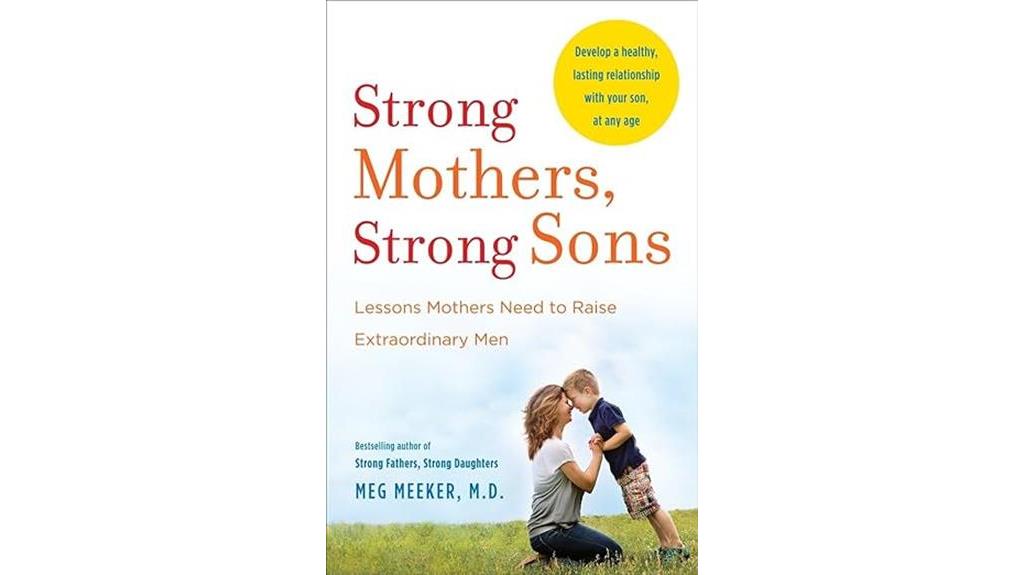
For mothers seeking to strengthen their bond with their sons and explore the challenges of raising boys, 'Strong Mothers, Strong Sons: Lessons Mothers Need to Raise Extraordinary Men' by Meg Meeker, M.D., offers invaluable insights and practical guidance.
This book delves into the intricacies of the mother-son relationship, highlighting the unique needs of boys and the importance of fostering courage in them. Dr. Meeker addresses the specific challenges faced by single mothers, emphasizing the significance of love, understanding, and repairing relationships.
Readers have praised the book for its blend of scientific evidence, personal anecdotes, and faith-based perspectives. By providing guidance on managing societal pressures on boys and building a healthy relationship with sons, this book equips mothers with a deeper understanding of their sons and valuable tools for nurturing their growth into extraordinary men.
Best For: Parents seeking practical guidance on fostering strong relationships with their sons and navigating the complexities of raising boys.
Pros:
- Offers valuable insights into the mother-son relationship and the unique needs of boys.
- Blend of scientific evidence, personal stories, and faith-based insights provides a well-rounded perspective.
- Provides practical advice for building a healthy relationship with sons and improving parenting strategies.
Cons:
- Some readers may find the religious references more suitable for conservative or religious audiences.
- Potential issues with print quality, such as missing pages, reported by some readers.
- Critiques on the suitability of the content for all parenting styles and beliefs.
Moms Moving On: Real Life Advice on Conquering Divorce, Co-Parenting Through Conflict, and Becoming Your Best Self
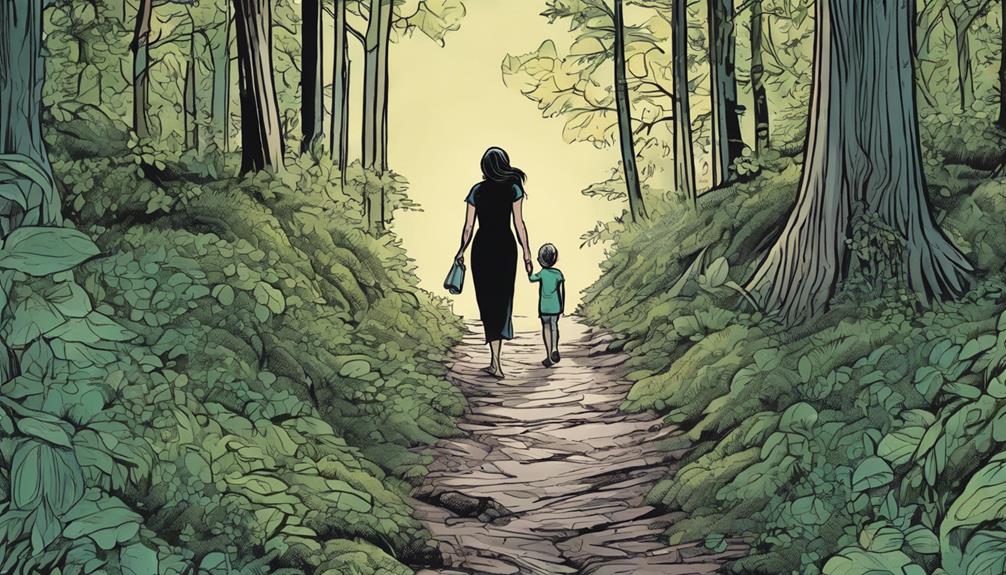
Seeking practical guidance on managing divorce, co-parenting conflicts, and personal growth? 'Moms Moving On' offers real-life advice and valuable insights for moms facing these challenges. Readers praise the book for its relatable content, humor, and practical tips. It provides comfort, support, and encouragement through the author's personal experiences.
Highly recommended for individuals going through divorce or supporting someone in this journey, the book is described as informative, empowering, and a source of hope during challenging times. Readers express gratitude for its impact on their healing process, highlighting its ability to address fears, offer peace, and serve as a detailed guide for handling divorce and co-parenting.
Michelle's engaging writing style resonates with readers, providing relatability, practical advice, and emotional depth to support them through these difficult changes.
Best For: Those navigating divorce, co-parenting challenges, and seeking personal growth guidance.
Pros:
- Relatable content and personal experiences shared by the author.
- Practical tips and humor make the advice easily digestible.
- Provides comfort, support, and encouragement during difficult transitions.
Cons:
- May not offer solutions for every unique situation.
- Some readers may prefer a more structured approach to advice.
- Could benefit from more diverse perspectives on the topics discussed.
Wisdom On Step-Parenting: How to Succeed Where Others Fail
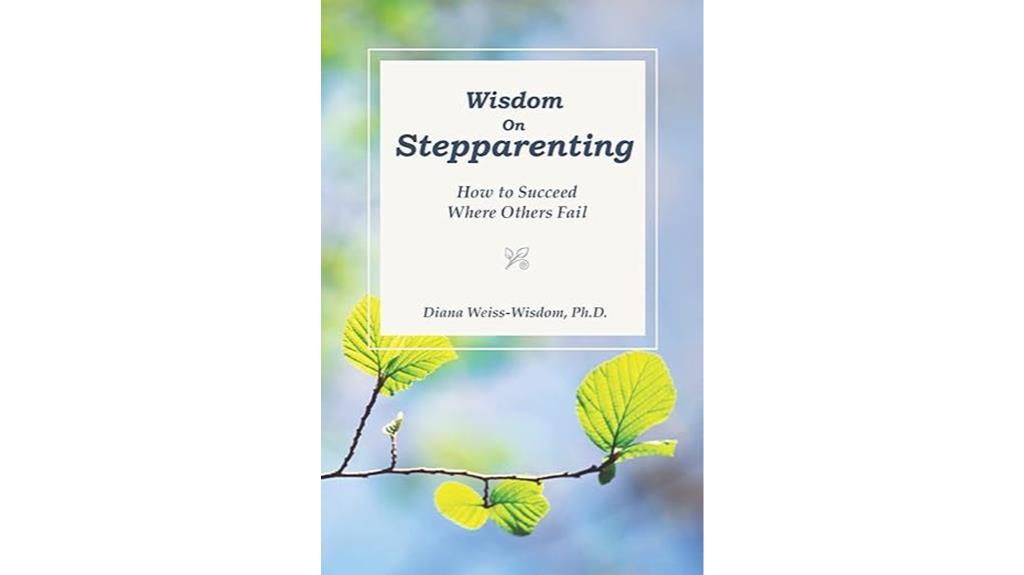
Best choice for professionals and blended families needing guidance on step-parenting, offering practical tools and exercises for immediate application. This book comes highly recommended for those seeking wise advice and spiritual insights to navigate the complexities of blended families.
Readers have found the advice and strategies provided to be helpful and insightful, with evidence-based approaches and a mindfulness component to aid in coping with challenges. While some appreciate the positive outlook presented, others feel the book may oversimplify or place excessive responsibility on the step-parent.
It's noted for offering exercises for readers to engage with, though some find the advice to be somewhat generalized. For those interested, there's another work by the same author, 'Step Coupling,' which is suggested for further exploration of step-parenting dynamics.
Best For: Professionals and blended families seeking practical tools and spiritual insights to navigate the complexities of step-parenting.
Pros:
- Offers practical tools and exercises for immediate application.
- Provides evidence-based strategies and a mindfulness component.
- Recommended for professionals and those looking for wise advice in blended families.
Cons:
- Some readers may find the advice to be somewhat generalized.
- The book may oversimplify or place excessive responsibility on the step-parent.
- Critiques on the author's generalizations and dated stereotypes.
How Parents Can Teach Children To Counter Negative Thoughts
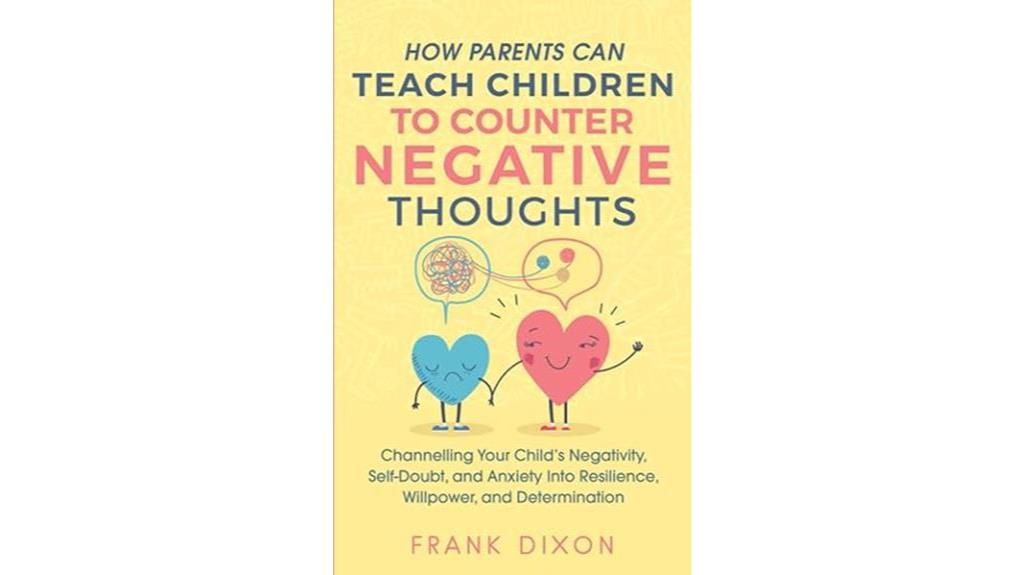
Parents looking to equip themselves with practical strategies for helping their children navigate negative thoughts and emotions should consider 'How Parents Can Teach Children To Counter Negative Thoughts' by Frank Dixon. This book offers valuable insights into redirecting children's negative thoughts and energy, providing tools and techniques to address issues like self-doubt and anxiety.
Readers recommend this book for its simple yet effective methods in helping children cope with negativity. It emphasizes the vital role parents play in shaping their children's thoughts and emotions, offering strategies to handle anxiety, self-doubt, and stress.
By implementing the techniques suggested in the book, parents can create a supportive environment that fosters positivity, resilience, and essential skills such as confidence and self-control. Despite some minor criticisms, this book is a practical resource for enhancing parenting skills and promoting a positive mindset in children.
Best For: Parents, teachers, and educators seeking practical strategies to help children counter negative thoughts and emotions.
Pros:
- Provides valuable insights and practical tools for redirecting children's negative thoughts.
- Emphasizes the crucial role parents play in shaping children's emotions and thoughts.
- Offers simple yet effective techniques to help children cope with anxiety, self-doubt, and stress.
Cons:
- Some readers have mentioned issues with editing and grammar.
- May require consistent effort and time investment from parents to implement the strategies effectively.
- The book may not address more complex psychological issues that some children may face.
How to Really Love Your Adult Child: Building a Healthy Relationship in a Changing World
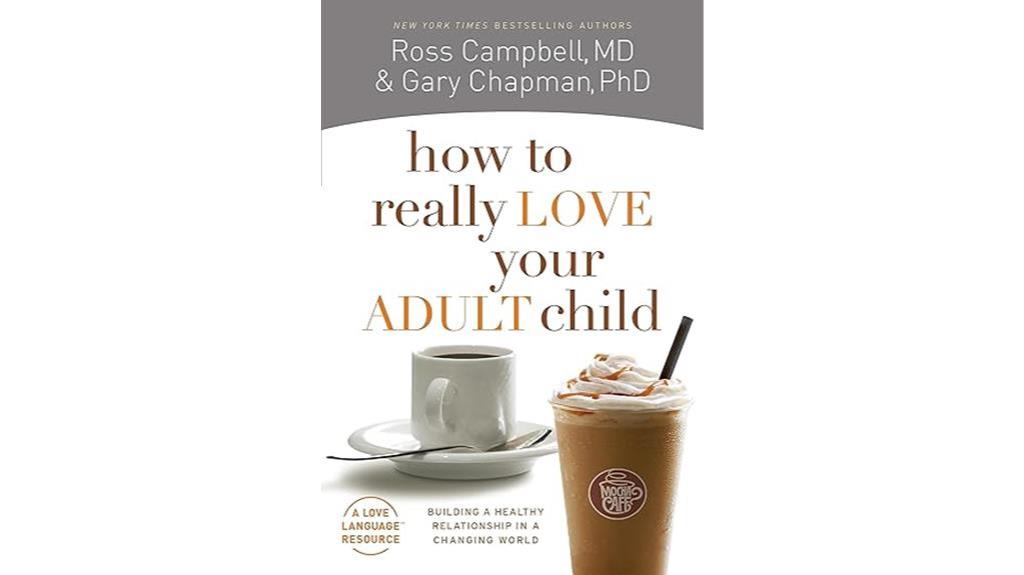
For those looking to strengthen their relationship with their adult children and navigate the complexities of modern parenting, 'How to Really Love Your Adult Child: Building a Healthy Relationship in a Changing World' provides invaluable guidance and insights.
This book offers practical advice on understanding and supporting adult children in today's world. It emphasizes the importance of setting expectations early, fostering open communication, and encouraging independence.
With changing societal norms and challenges like student debt and job scarcity, the book helps parents comprehend the struggles young adults face. By focusing on building loving relationships and leaving positive legacies, it equips parents with strategies to navigate diverse scenarios and maintain healthy connections with their adult children.
Readers appreciate the straightforward approach and find the book beneficial for enhancing parent-child dynamics.
Best For: Parents seeking practical guidance on fostering healthy relationships with their adult children in today's changing world.
Pros:
- Offers practical advice on understanding and supporting adult children.
- Emphasizes setting expectations early and fostering open communication.
- Provides strategies for navigating diverse scenarios and maintaining healthy connections.
Cons:
- May not address all unique individual family dynamics.
- Some readers may prefer more in-depth case studies or examples.
- Might not resonate with parents who have vastly different parenting styles.
Dad On Purpose: The Busy Dads Playbook
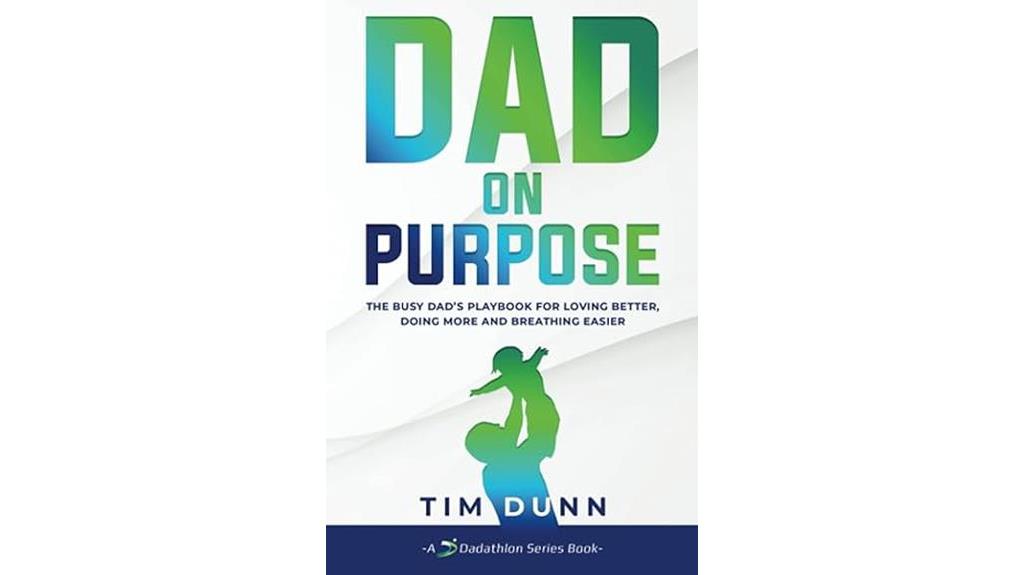
As a busy dad looking to enhance your parenting skills and strengthen your bond with your children, 'Dad On Purpose: The Busy Dads Playbook' is a must-read choice. This book has garnered praise for its detailed and funny writing style, offering practical advice for dads of all stages. It emphasizes the significance of quality time spent with your children and provides insights on connecting with daughters and sons individually.
'Dad On Purpose' covers various topics including improving relationships with spouses, setting boundaries, financial management, health, scheduling, and mental well-being. Readers have found the actionable ideas, relatable anecdotes, and valuable 'Dad Hacks' to be transformative.
This extensive guide has helped many dads enhance their parenting skills, fostering positive changes in their relationships and approaches to fatherhood.
Best For: Dads at all stages seeking practical advice and tips to enhance their parenting skills and strengthen their bond with their children.
Pros:
- Practical advice for dads on various parenting aspects.
- Insightful tips on connecting with children individually.
- Valuable 'Dad Hacks' and relatable anecdotes for transformative impact.
Cons:
- May not cover advanced or specialized parenting techniques.
- Some suggestions may be basic for experienced fathers.
- Limited focus on specific challenges faced by fathers in unique situations.
Factors to Consider When Choosing Books to Read on Parenting
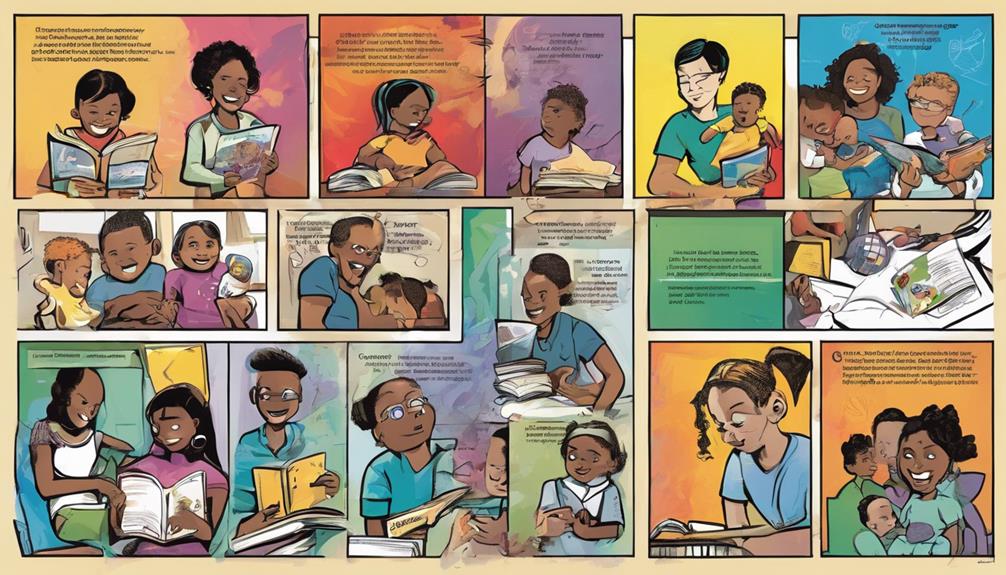
When choosing books on parenting, it's crucial to take into account factors such as the selection criteria, reader recommendations, and practical application.
These aspects can offer valuable insights into diverse perspectives and the potential impact on one's parenting journey.
Selection Criteria
When choosing books to read on parenting, consider the author's credentials and expertise in parenting or child development. It's important to look for books that resonate with your parenting style and values, ensuring that the advice provided aligns with your beliefs.
Checking reviews and recommendations from other parents or professionals can give you an idea of the book's effectiveness and relevance. Opt for books that offer practical strategies and techniques to tackle everyday parenting challenges, as well as those that cater to the specific needs of your child's age group.
Additionally, consider the author's background in parenting, child development, or psychology to assess their credibility. Choose books that provide actionable tips, real-life examples, and advice that you can apply in your parenting journey.
Make sure the books you select match your parenting goals, values, and current concerns, covering a range of topics that address your unique challenges.
Reader Recommendations
In my search for parenting books, I prioritize recommendations that emphasize practicality and relatability in addressing everyday challenges. Readers often suggest books that have proven effective in enhancing parenting skills and managing children's behavior. Personal experiences and positive outcomes from implementing techniques found in these books drive many recommendations. The ability of these books to influence parenting approaches positively and nurture better parent-child relationships is a common reason for their endorsement.
Specific strategies, principles, and actionable tips shared in the books make them valuable resources for parents seeking guidance. Factors such as practicality, relatability, and ease of implementation of the advice contribute significantly to strong reader recommendations. Additionally, personal preferences, parenting styles, values, and specific challenges play an important role in selecting the right book. The reputation of the author, their expertise in parenting, and the book's readability, engaging content, organization, and structure are also key considerations for readers when choosing a parenting guide.
Practical Application
Consider the importance of alignment with personal parenting style and values when selecting books on parenting for effective implementation of strategies and techniques. Evaluate the book's relevance to your daily parenting challenges and goals.
Look for step-by-step guidance and practical tips that you can easily apply in real-life scenarios. Prioritize books that offer evidence-based practices and expert advice to support their recommendations.
Choose resources that resonate with your parenting philosophy and provide actionable strategies for nurturing strong relationships with your children and spouse. Additionally, seek books that address common parenting issues like setting boundaries, financial management, and mental well-being.
Age-appropriate activities and bonding ideas can enhance your parent-child interactions, so consider books that offer such suggestions. Finally, look for references to valuable resources like age-appropriate media to support your parenting journey.
Diverse Perspectives
Exploring books on parenting that offer diverse perspectives can provide valuable insights and a deeper understanding of the complexities of raising children in today's diverse society. These books encompass a range of approaches and insights from various cultural backgrounds, experiences, and parenting styles. By delving into diverse perspectives, readers can broaden their understanding of different parenting practices and the challenges faced by diverse families. This exploration fosters empathy, respect, and awareness of varied parenting techniques and cultural norms.
Authors with unique insights and experiences enrich the content, offering a plethora of viewpoints on family dynamics and solutions to parenting challenges. Embracing diverse perspectives promotes inclusivity, cultural sensitivity, and a deeper connection to the multifaceted nature of parenting in our modern world. Reading books that showcase diverse perspectives not only enriches our knowledge but also encourages empathy, understanding, and inclusivity in our parenting practices.
Impact on Parenting
Books on parenting play a pivotal role in shaping parenting practices and can profoundly influence how parents approach raising their children. These resources offer valuable insights, strategies, and techniques that can positively impact parenting styles and interactions with children.
By delving into topics like child development, communication, discipline, and relationship-building, parents can gain a deeper understanding of their role and enhance their skills. Reading parenting books can also foster self-awareness, mindfulness, and emotional intelligence in parents, which ultimately benefits their children.
The evidence-based information, practical tips, and real-life examples provided in these books guide parents in nurturing happy, healthy, and well-adjusted children. Research indicates that parents who engage with parenting books often develop stronger relationships with their children, improved communication skills, and enhanced abilities to navigate challenging situations.
Personal Experiences
When seeking parenting books to read, personal experiences shared by other readers can offer valuable insights into the practical application and effectiveness of different strategies. Readers' anecdotes often highlight the impact of implementing strategies from parenting books in real-life situations, showcasing how these resources have helped individuals navigate challenging parenting scenarios. These personal stories provide relatable and practical perspectives, showing how growth and improved parent-child relationships are common themes when applying techniques from parenting books.
Moreover, personal experiences shared in parenting books can offer relatable anecdotes and insights, helping parents feel less alone in their struggles and successes. By learning from the experiences of others, readers can gain different perspectives and approaches to common parenting challenges. These personal stories not only inspire reflection on one's own parenting journey but also provide comfort and encouragement by showing that solutions are within reach.
Frequently Asked Questions
How Can Parents Handle Sibling Rivalry Effectively?
When handling sibling rivalry, I find that establishing clear expectations and boundaries is essential.
Encouraging open communication and active listening helps address underlying issues.
Implementing fair consequences for negative behaviors and praising positive interactions can promote harmony.
Additionally, fostering individual relationships with each child can mitigate jealousy.
What Are Some Tips for Parents Dealing With Picky Eaters?
Dealing with picky eaters can be challenging for parents. I find that offering a variety of healthy options and involving kids in meal planning and preparation can help.
It's crucial to remain patient and avoid pressuring children to eat certain foods. Creating a positive mealtime environment without distractions can also make a difference.
Is It Possible to Parent Without Yelling or Losing Patience?
Parenting without yelling or losing patience is achievable with mindful practices. Setting clear boundaries, practicing self-care, and using positive reinforcement techniques can help maintain patience.
Communication is key; expressing emotions calmly and actively listening to your child can prevent escalation. Taking breaks when feeling overwhelmed allows for regaining composure.
How Can Parents Promote Independence in Their Children?
Fostering independence in children begins with granting them opportunities to make choices and learn from their experiences.
Encouraging self-reliance through age-appropriate tasks and responsibilities can nurture a sense of autonomy and confidence.
By providing guidance and support while allowing room for trial and error, parents can empower their children to develop vital life skills and problem-solving abilities.
Balancing supervision with freedom helps cultivate a healthy sense of independence that prepares kids for future challenges.
What Are Some Strategies for Parents to Manage Screen Time Effectively?
To manage screen time effectively, I set clear limits and establish tech-free zones in my home. I encourage outdoor activities and offer alternative forms of entertainment. Using parental controls on devices helps me monitor usage.
Regular discussions about responsible screen time habits and leading by example are essential. I prioritize quality screen time over quantity, ensuring my child engages in educational and age-appropriate content. Balancing technology with other activities is key to fostering a healthy relationship with screens.
Are the Recommended Parenting Books Suitable for New and Experienced Parents?
When it comes to expert parenting book recommendations for the first year, it’s important to consider the needs and experience level of the parents. While new parents may benefit from guides focused on the basics of infant care, experienced parents might seek books that offer more advanced insights and strategies for parenting.
Conclusion
To wrap up, when it comes to parenting, knowledge is power. By equipping yourself with the right tools and resources, such as the 15 best books recommended by experts, you can navigate the challenges of raising children with confidence and grace.
Remember, as the saying goes, 'It takes a village to raise a child.' So, gather your village of wisdom through these insightful books and start on the journey of parenting with a strong foundation of knowledge and support.
Vetted
14 Best Self-Help Parenting Books Every Parent Should Read for a Happier Family
Leverage the power of self-help parenting books to transform your family dynamics and cultivate a happier home – discover essential insights and strategies within!

**Hunting for a happier family?** Check out the ’14 Best Self-Help Parenting Books’ for practical advice and smart strategies. Books like ‘How to Stop Losing Your Sh\*t with Your Kids,’ ‘Raising Good Humans,’ and ‘Parenting from the Inside Out’ help with building self-awareness, mindful parenting, and personal growth. Also, ‘The 7 Habits of Highly Effective Teens,’ ‘Moms Moving On,’ and ‘Teen Girls Survival Guide’ offer extra support. These guides provide tools to handle tough times and improve family vibes. They aim to give parents a richer, more joyful parenting journey.
Key Takeaways
- Consider author credentials and expertise for credible advice.
- Select books with practical strategies and tangible techniques.
- Look for alignment with your parenting style and values.
- Choose books that offer actionable advice for specific challenges.
- Prioritize books that foster personal growth and positive parenting practices.
How to Stop Losing Your Sh*t with Your Kids: A Practical Guide to Becoming a Calmer, Happier Parent

For parents seeking practical solutions to manage stress and improve their parenting skills, 'How to Stop Losing Your Sh*t with Your Kids' offers valuable insights and strategies. This book has garnered positive reviews for its relatable and easy-to-understand content. Readers appreciate the author's humorous acronyms and conversational tone, making the advice both helpful and engaging.
The author's writing style is described as honest and compassionate, resonating well with readers looking for realistic solutions to parenting challenges. Additionally, the book's focus on self-awareness and self-control has helped many readers gain a new perspective on their parenting approach.
While some critiques mention the lack of addressing men's roles in parenting and concerns about language use, overall, 'How to Stop Losing Your Sh*t with Your Kids' seems to have a positive impact on readers' self-perception and parenting skills.
Best For: Parents looking for a practical and humorous guide to improve their parenting skills and reduce stress levels.
Pros:
- Relatable and easy-to-understand content.
- Author's humorous acronyms and conversational tone keep readers engaged.
- Emphasis on self-awareness and self-control for personal growth in parenting.
Cons:
- Lack of addressing men's roles in parenting.
- Some readers find the language disrespectful towards children.
- Organizational issues mentioned by some critiques.
Raising Good Humans: A Mindful Guide to Breaking the Cycle of Reactive Parenting
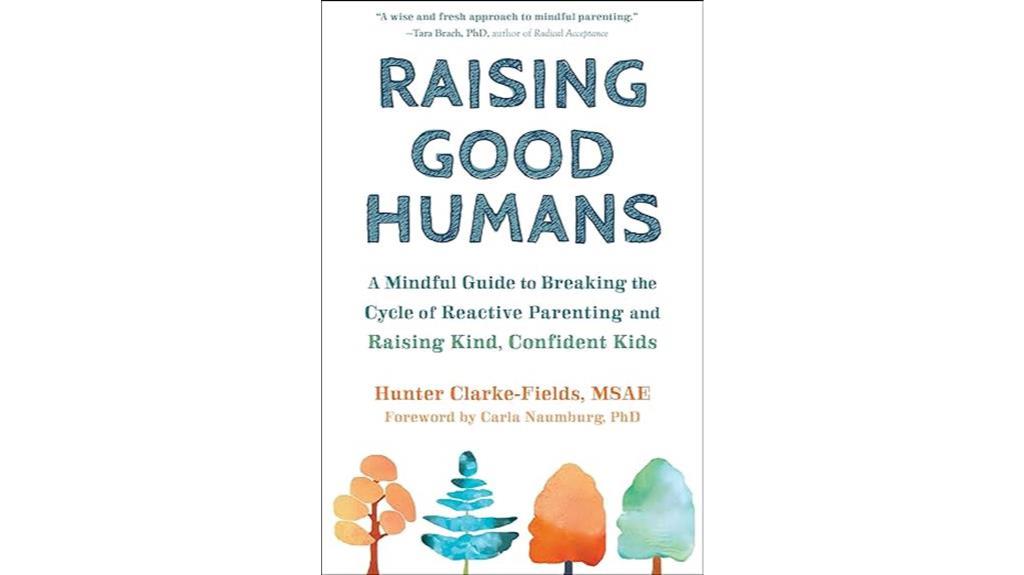
'Raising Good Humans: A Mindful Guide to Breaking the Cycle of Reactive Parenting' offers practical strategies for transforming parenting habits and fostering healthier family dynamics. This book has garnered positive reviews and recommendations from readers who found it insightful and valuable.
Many parents, especially first-timers, appreciate the engaging way it delivers essential information. Readers highlight the importance of self-work and patience in parenting, emphasizing its impact on parenting approaches. By providing effective strategies, the book helps parents handle challenging moments with children and break the cycle of reactive parenting.
While some readers faced challenges unlearning their upbringing, the emphasis on self-work and mindfulness practices proves beneficial. Personal experiences shared reveal how the book aids in identifying triggers, working through underlying issues, and promoting self-reflection for improved parenting.
Specific techniques like I language and win-win discussions, alongside mindfulness practices, equip parents to tackle parenting challenges more effectively.
Best For: Parents seeking to break the cycle of reactive parenting and cultivate mindful and effective parenting practices.
Pros:
- Insightful and valuable information presented in an engaging manner.
- Effective strategies for handling challenging moments with children.
- Encourages self-work, mindfulness practices, and self-reflection for improved parenting.
Cons:
- Some readers may find unlearning their upbringing challenging.
- Initial difficulty in approaching mindfulness practices for a few readers.
- The emphasis on self-work and patience in parenting may require a significant commitment.
Parenting from the Inside Out: How a Deeper Self-Understanding Can Help You Raise Children Who Thrive
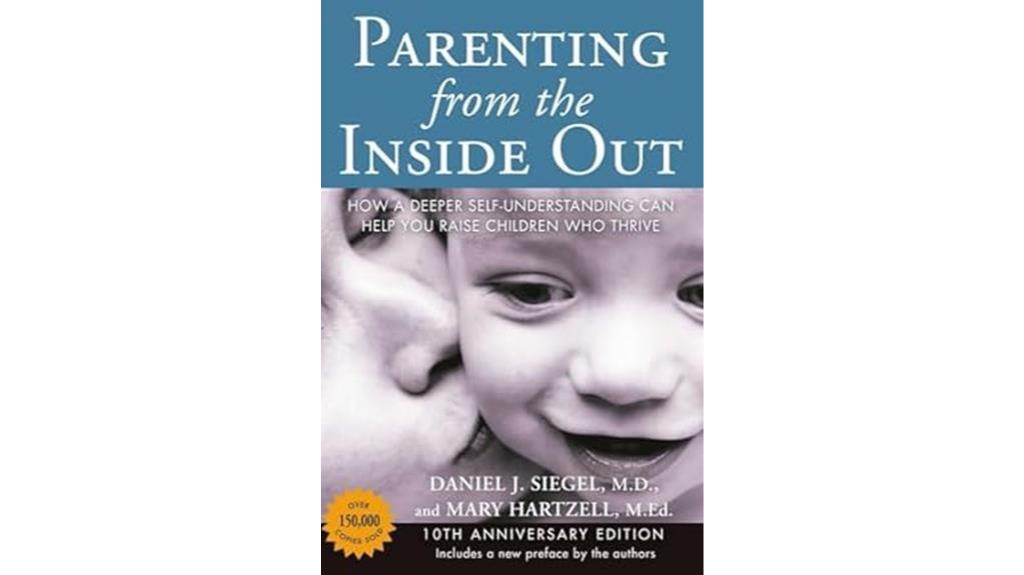
In my experience, 'Parenting from the Inside Out' is a transformative read for individuals seeking to understand themselves deeply while nurturing thriving children. This book explores the connection between a parent's own emotional experiences and their parenting style, emphasizing the importance of self-awareness in raising children.
By investigating how our past influences our present behaviors, readers can gain valuable insights into breaking negative cycles and fostering healthier relationships with their children. The integration of personal anecdotes, professional insights, and scientific research makes this book both engaging and informative.
Through exercises and practical guidance, 'Parenting from the Inside Out' offers a roadmap for personal growth and self-understanding, ultimately leading to more fulfilling and effective parenting practices.
Best For: Parents and individuals seeking to deepen their self-understanding to improve their parenting skills and nurture thriving children.
Pros:
- Integrates personal anecdotes, professional insights, and scientific research for a comprehensive understanding.
- Offers practical exercises and guidance for personal growth and self-understanding.
- Provides valuable insights into breaking negative cycles and fostering healthier parent-child relationships.
Cons:
- May require deep introspection and emotional exploration, which can be challenging for some readers.
- The depth of psychological insights may be overwhelming for those seeking a more surface-level parenting guide.
- Not a quick-fix solution, as implementing the strategies and concepts requires ongoing effort and self-reflection.
The 7 Habits of Highly Effective Teens
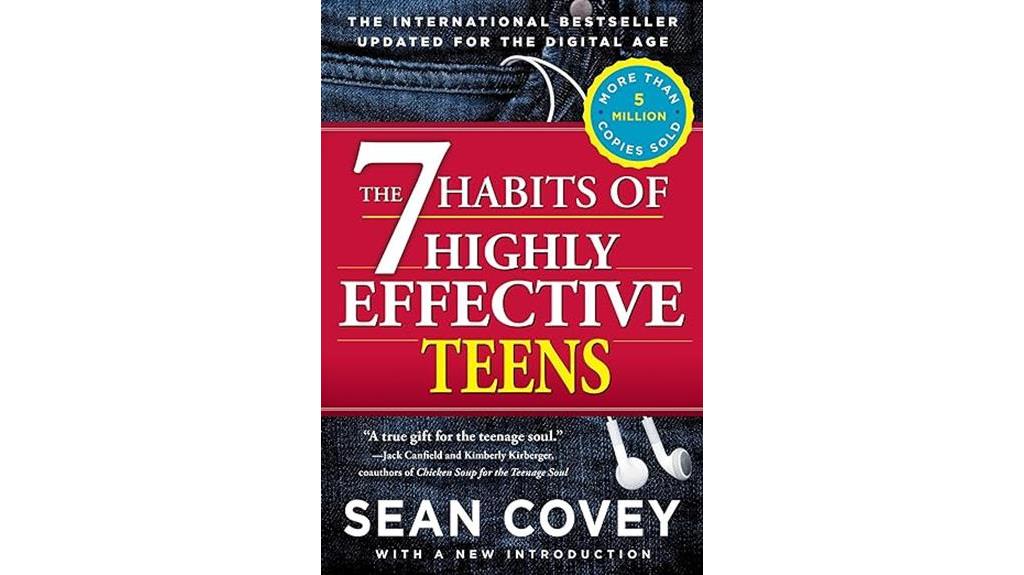
One essential resource for nurturing a harmonious family dynamic is exploring 'The 7 Habits of Highly Effective Teens.' This book offers practical advice and logical tips for teen success, making it impactful and life-changing for readers of all ages.
It's highly recommended for teenagers and young people, serving as a great starting point for personal development. With fantastic student takeaways in high school health classes and positive feedback from readers, this book is ideal for reluctant readers due to its creative approaches.
Whether introduced to teens at a young age or gifted to adolescents, 'The 7 Habits of Highly Effective Teens' is a compact and handy resource containing wonderful concepts for habit development, reflection on personal goals, and behavioral improvements.
Best For: Teens and adolescents seeking practical advice and tips for personal development in a compact and easy-to-understand format.
Pros:
- Highly educative and informative for young readers.
- Impactful and life-changing content suitable for teenagers.
- Great starting point for habit development and reflection on personal goals.
Cons:
- Some may find the book too small in size.
- May not appeal to readers looking for in-depth analysis or lengthy content.
- Limited scope for advanced personal development strategies.
Moms Moving On: Real Life Advice on Conquering Divorce, Co-Parenting Through Conflict, and Becoming Your Best Self

For moms managing divorce, co-parenting challenges, and seeking personal growth, 'Moms Moving On' offers invaluable real-life advice and support. This book provides practical tips, humor, and guidance for handling the complexities of divorce and co-parenting conflicts.
Readers praise the author, Michelle, for her relatable experiences and insightful advice, finding comfort and encouragement in her words. 'Moms Moving On' is highly recommended for those going through or considering divorce, as well as for individuals supporting loved ones on this journey.
The impact of this book is evident in the gratitude expressed by readers for its role in their healing process and its ability to address fears and offer hope. Michelle's writing style fosters a sense of connection and understanding, making 'Moms Moving On' a valuable companion for those facing divorce and co-parenting challenges.
Best For: Individuals navigating divorce, co-parenting challenges, and seeking personal growth.
Pros:
- Offers real-life advice and practical tips for handling divorce and co-parenting conflicts.
- Author's relatable experiences and insightful advice provide comfort and encouragement.
- Highly recommended for those going through or considering divorce, as well as for support systems.
Cons:
- May not address all specific individual situations.
- Some readers may find the content emotionally challenging.
- Limited focus on legal aspects of divorce and co-parenting.
Atomic Habits: An Easy & Proven Way to Build Good Habits & Break Bad Ones
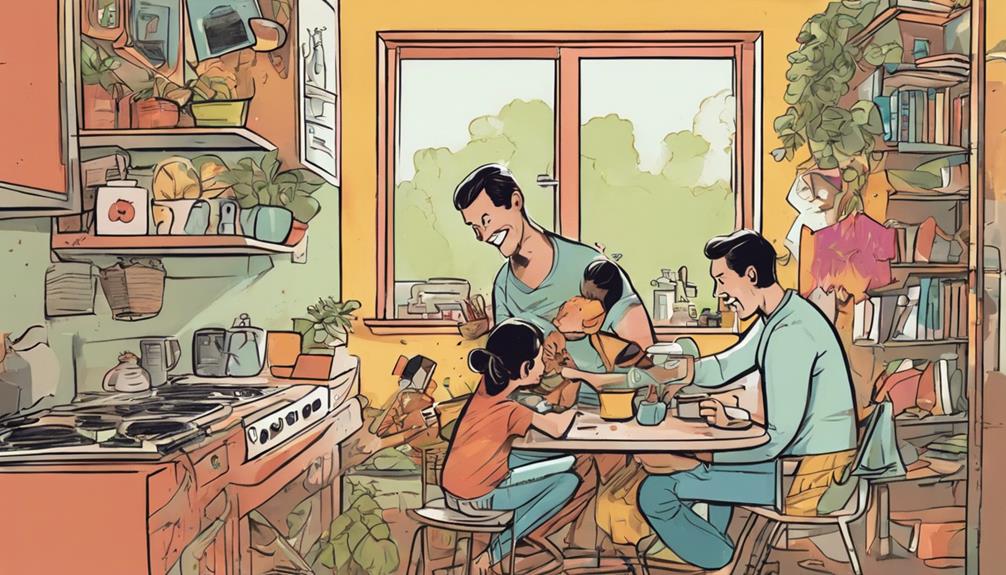
Parents seeking practical strategies to improve family dynamics and foster a happier household will find 'Atomic Habits: An Easy & Proven Way to Build Good Habits & Break Bad Ones' an invaluable resource. In this book, author James Clear shares personal insights and strategies to help readers understand how habits impact life outcomes.
By focusing on making small changes that compound over time, individuals can achieve remarkable results. Clear emphasizes the importance of identity-based habits for lasting change and breaks down the behavior change process into cues, cravings, responses, and rewards.
Practical tips on building good habits include leveraging cues, creating attractive opportunities, making habits easy, and ensuring habits are satisfying. By implementing the principles outlined in 'Atomic Habits,' families can work towards creating a positive and fulfilling environment together.
Best For: Individuals seeking practical strategies to improve their habits and transform their life outcomes.
Pros:
- Provides actionable insights and strategies for building good habits and breaking bad ones.
- Emphasizes the importance of identity-based habits for lasting change.
- Offers practical tips on making habits attractive, easy, and satisfying for long-term success.
Cons:
- May require consistent effort and commitment to see significant results.
- Some strategies may not resonate with every individual's lifestyle or preferences.
- Implementing all the recommended habits simultaneously could be overwhelming for some people.
The Worlds Best Dad During and After Divorce: A Guide to Co-Parenting for Divorced Dads

Amidst the challenges of divorce, this guide equips fathers with practical strategies to navigate co-parenting complexities and maintain a positive presence in their children's lives. The book offers a thorough approach, addressing key aspects like communication, conflict resolution, and creating a balanced home environment.
It empowers divorced dads to handle the difficulties of divorce with grace and positivity, ensuring they continue to play influential and loving roles in their children's lives. Reader feedback appreciates the book's focus on fathers and its easy-to-understand tone, making it a valuable resource for dads seeking guidance during and after divorce.
While some readers noted gaps in handling unique situations, the book overall provides insightful perspectives on co-parenting, emphasizing the well-being of children. Personal experiences shared by readers highlight the book's role in maintaining focus and offering guidance on priorities during the divorce journey.
Recommendations suggest that individuals going through divorce can benefit from the book's practical ideas and suggestions, helping them stay focused on being the best dads they can be. Overall, the long-term impact of this guide is seen in its enduring value years after divorce, emphasizing the importance of maintaining a positive environment for children and prioritizing fatherhood.
Best For: Dads who are navigating the challenges of divorce and seeking practical guidance on co-parenting to maintain a positive relationship with their children.
Pros:
- Offers practical strategies and real-life advice for divorced dads.
- Addresses key aspects of co-parenting like communication and conflict resolution.
- Empowers fathers to handle divorce challenges with grace and positivity.
Cons:
- May have gaps in addressing unique or challenging circumstances.
- Some readers might find the information not comprehensive enough for all scenarios.
- Could benefit from more in-depth strategies for specific co-parenting situations.
How to Talk So Kids Will Listen & Listen So Kids Will Talk

When seeking practical strategies to enhance communication with children, exploring 'How to Talk So Kids Will Listen & Listen So Kids Will Talk' can greatly benefit one's parenting approach. This book offers clear and manageable advice on relevant parenting issues, encouraging reflection and mindset shifts in parenting styles.
Readers appreciate the helpful exercises and techniques provided, finding them easy to apply to different parenting situations. It includes specific words and phrases for parents to use in challenging moments, fostering effective communication with kids. Many readers highly recommend the book for its practical and encouraging approach to gentle parenting.
Despite some finding the book overly long, it's acknowledged for its practical tips and tricks for improving parent-child communication. Overall, 'How to Talk So Kids Will Listen & Listen So Kids Will Talk' is a valuable resource for parents looking to enhance their communication skills with children.
Best For: Parents seeking practical and effective strategies for improving communication with their children.
Pros:
- Clear and manageable advice on relevant parenting issues.
- Helpful exercises and techniques for different parenting situations.
- Encourages reflection and mindset shifts in parenting styles.
Cons:
- Some readers may find the book overly long and intimidating.
- Suggestions for a newer, shortened edition without unnecessary filler have been made.
- Despite some criticism, the book still offers practical tips and strategies for parent-child communication.
The Book You Wish Your Parents Had Read

For those seeking a candid and empathetic guide to parenthood that explores unconventional wisdom and emphasizes emotional connection, 'The Book You Wish Your Parents Had Read' by Philippa Perry is a valuable resource.
This book delves into the emotional aspects of parenting, prompting reflection on our upbringing and offering practical tools for enhancing communication and empathy within the family. Perry's approach, which views children as individuals with whom we've lifelong relationships, presents a fresh perspective compared to traditional parenting advice.
Readers have found this book instrumental in understanding their parenting styles, fostering healthier relationships, and making positive changes in their interactions with their children. Additionally, individuals who've faced emotional abuse or difficult parenting situations have found solace and guidance in 'The Book You Wish Your Parents Had Read', making it a recommended read for those seeking to nurture empathetic and loving relationships with their children.
Best For: Parents and caregivers seeking a compassionate and insightful guide to parenting that prioritizes emotional connection and empathy.
Pros:
- Encourages reflection on parenting styles and upbringing
- Offers practical tools for building communication and empathy within the family
- Provides a fresh perspective on viewing children as individuals with lifelong relationships
Cons:
- Contains sections that are opinion-based rather than solely research-based
- Some readers find a mix of insightful concepts and common knowledge, leading to varying degrees of factual information
- May not resonate with individuals looking for a strictly traditional parenting approach
Baby Knows Best: Raising a Confident and Resourceful Child, the RIE™ Way
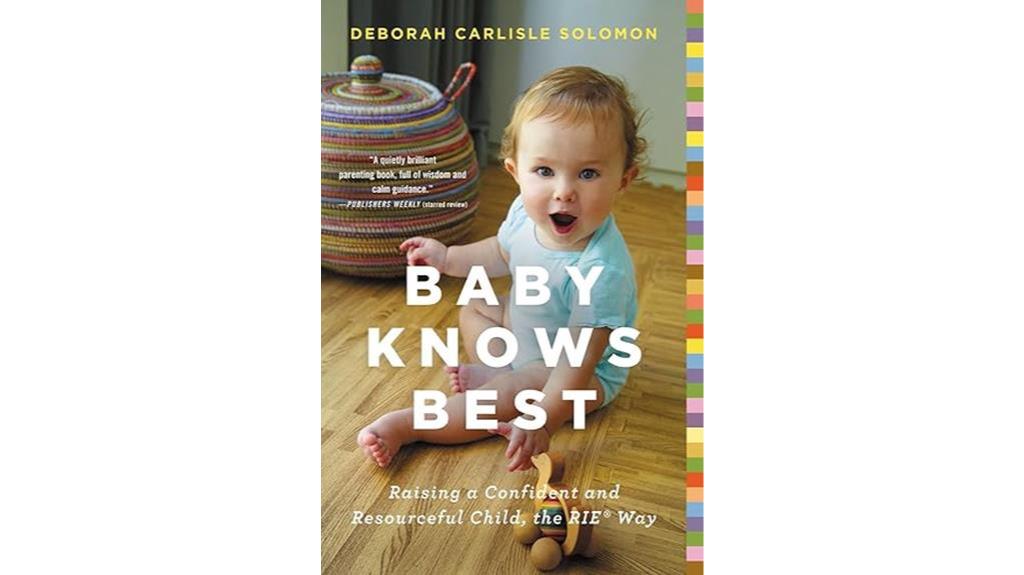
The book 'Baby Knows Best: Raising a Confident and Resourceful Child, the RIE™ Way' is a must-have for parents and professionals looking to adopt a child-led approach to parenting. This book emphasizes the RIE philosophy, which focuses on promoting children's independence and self-confidence.
By encouraging children to explore and problem-solve on their own, parents can support their natural development and foster a sense of autonomy. The RIE principles highlighted in the book include praising effort over achievement, acknowledging feelings, and providing a safe environment for self-directed play.
Implementing these strategies can lead to reduced parental stress, stronger parent-child connections, and improved communication skills. 'Baby Knows Best' offers practical guidance for respectful parenting, making it a valuable resource for anyone looking to enhance their parenting skills and create a happier family dynamic.
Best For: Parents and professionals seeking a child-led approach to parenting that emphasizes independence and self-confidence.
Pros:
- Practical guidance for implementing RIE philosophy in parenting.
- Positive impact on parent-child relationships and communication.
- Focus on fostering children's autonomy and problem-solving skills.
Cons:
- May require a shift in mindset for parents accustomed to more traditional parenting styles.
- Some concepts may be challenging to implement consistently.
- Not all strategies may resonate with every parent's parenting philosophy.
The Self-Driven Child: Giving Kids More Control Over Their Lives
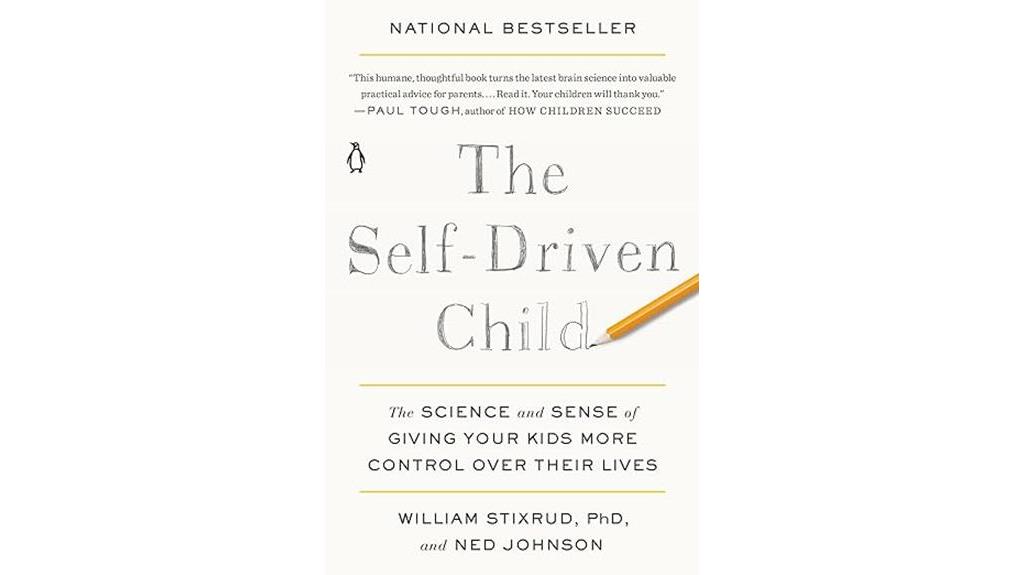
Parents seeking to empower their children and promote autonomy will find 'Parenting Books for a Happier Family' an invaluable resource for fostering resilience and internal motivation in their kids. In 'The Self-Driven Child: The Science and Sense of Giving Your Kids More Control Over Their Lives', authors William Stixrud and Ned Johnson emphasize the importance of creating a sense of control in children's lives to prepare them for the challenges they'll face.
The book advocates for a shift from a controlling to a consulting role as a parent, encouraging children to take more control over their decisions. By focusing on stress management and autonomy, parents can help their children develop resilience and internal motivation. Practical advice includes allowing children space to make decisions, promoting autonomy, competence, and relatedness, and offering empowering mental strategies for motivation and success.
The book's impact is evident in improved parent-child relationships and empowered children making confident decisions.
Best For: Parents, coaches, and teachers seeking to empower children to take control over their lives and improve resilience and internal motivation.
Pros:
- Encourages a shift from controlling to consulting parenting approach.
- Provides practical advice on stress management and autonomy.
- Offers empowering strategies for children's motivation and success.
Cons:
- Some parents may struggle to transition from a controlling to a consulting role.
- Requires consistent effort and patience to implement the book's principles effectively.
- May not fully address specific individual challenges faced by every child.
Teen Girls Survival Guide: Make Friends, Build Confidence, Avoid Peer Pressure, Overcome Challenges, Prepare for Future
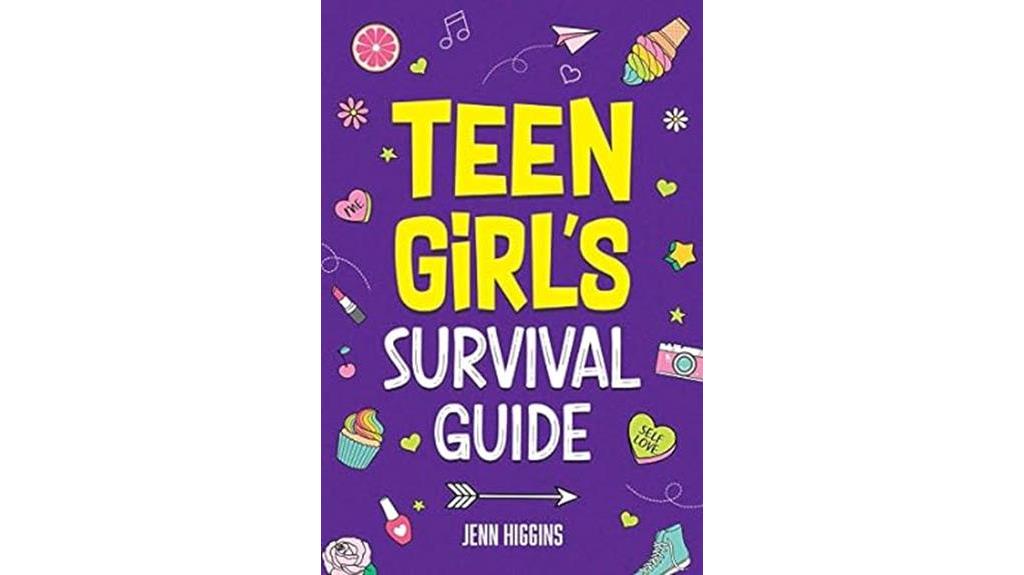
A must-have guide for helping teen girls navigate friendships, boost confidence, resist peer pressure, overcome challenges, and prepare for the future is the Teen Girls Survival Guide. This book has received positive feedback from both teenage girls and parents.
Teenagers have found it helpful in improving their communication skills and becoming more comfortable discussing important topics. Parents appreciate the book's direct approach and its ability to engage even reluctant readers.
The guide covers a wide range of subjects relevant to teenage girls, such as self-care in social settings and the importance of seeking help from trusted adults when needed.
With recommendations and positive reviews highlighting its effectiveness, the Teen Girls Survival Guide proves to be a valuable resource for young girls entering their teen years.
Best For: Parents looking for a comprehensive guide to help their teenage girls navigate friendships, boost confidence, resist peer pressure, overcome challenges, and prepare for the future.
Pros:
- Provides practical advice on communication and self-care for teenage girls.
- Engages both teenage girls and parents with its direct and informative approach.
- Covers a wide range of relevant topics for young girls transitioning into their teen years.
Cons:
- May not appeal to teenage girls who are resistant to self-help or guidance books.
- Some readers may find certain sections too mature or advanced for younger teenagers.
- Parents may need to encourage reluctant readers to engage with the content.
The Daily Dad: 366 Meditations on Parenting, Love, and Raising Great Kids
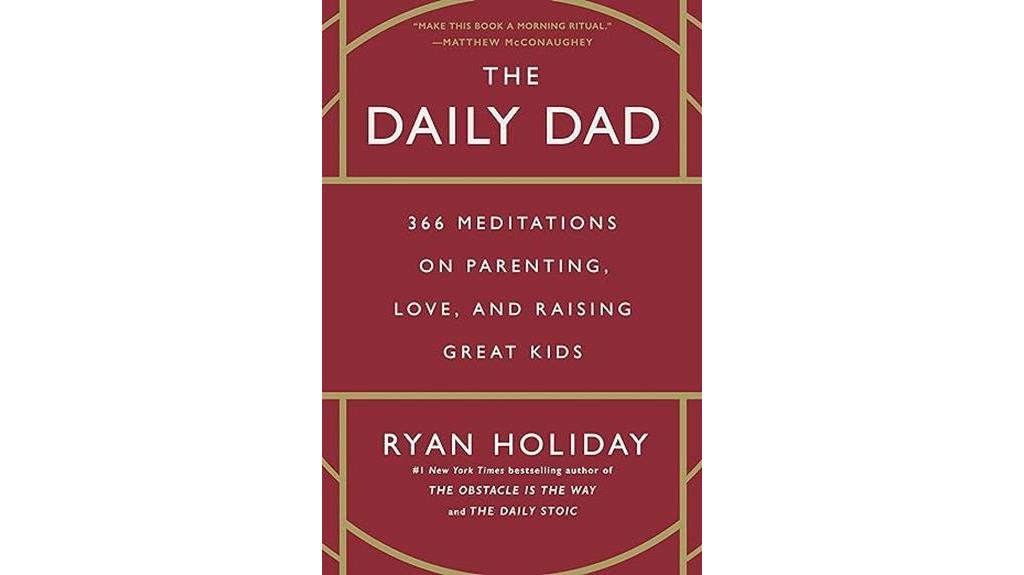
Ideal for dads seeking daily inspiration and practical parenting advice, 'The Daily Dad: 366 Meditations on Parenting, Love, and Raising Great Kids' offers valuable insights for managing fatherhood. With 366 concise meditations, this book provides bite-sized reflections perfect for busy dads like me. Drawing from personal experiences, timeless wisdom, and modern parenting research, each meditation touches on various aspects of fatherhood, fostering a sense of community and connection among fathers.
Readers recommend this book for its daily mindful moments, highlighting its impact on new parents and its resonance with readers. Key insights stress the importance of being present with children and prioritizing their needs. 'The Daily Dad' serves as a guide for parents and educators, enhancing parenting skills to create a positive impact on children's lives.
Best For: Busy dads seeking daily inspiration and practical parenting advice.
Pros:
- Offers daily mindful moments for fathers, moms, or caregivers.
- Provides valuable insights on parenting, love, and raising great kids.
- Fosters a sense of community and connection among fathers.
Cons:
- Some aspects may come across as intense or political to certain readers.
- Criticisms regarding comparisons to other works by the author.
- Feedback on missing features like a built-in bookmark.
1-2-3 Magic: Gentle 3-Step Child & Toddler Discipline for Calm, Effective, and Happy Parenting
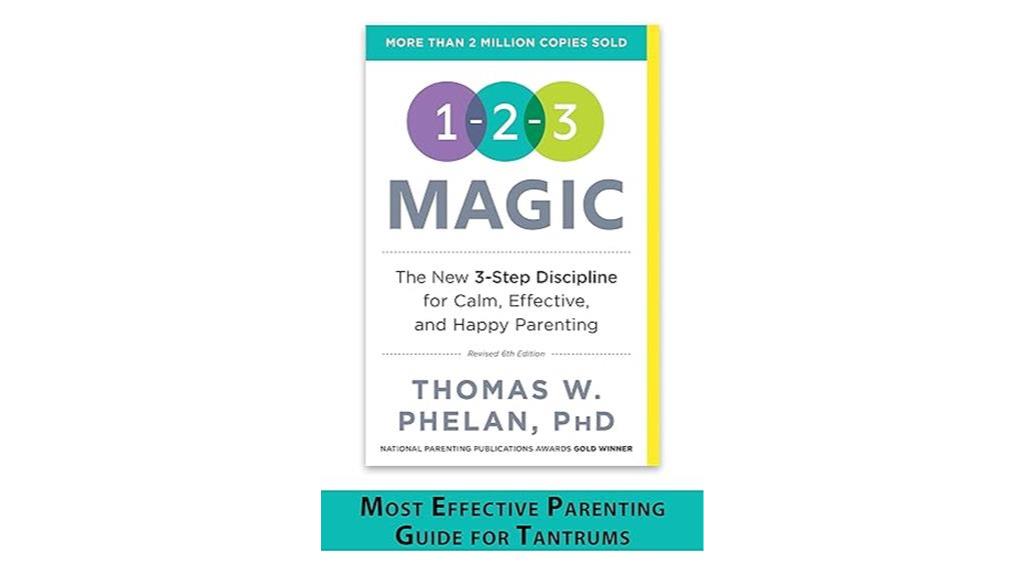
For those seeking a gentle and effective approach to child and toddler discipline, the 'Parenting Books for a Happier Family' offers the 1-2-3 Magic method as a calming and practical solution. This method introduces a 3-step process that emphasizes setting clear boundaries and using consequences to manage behavior.
Rather than engaging in lengthy discussions or escalating conflicts, parents can calmly implement the 1-2-3 Magic technique by giving a warning, counting to three, and applying a consequence if necessary. By focusing on consistency, simplicity, and maintaining composure, parents can create a more harmonious environment for their children.
The book provides specific guidance on using 'if/then' statements, ensuring that children understand the expectations and consequences of their actions. This method has received positive feedback from parents who've seen improvements in their children's behavior and a happier family dynamic.
Best For: Parents seeking a gentle and effective discipline approach for managing child and toddler behavior in a calm and practical manner.
Pros:
- Employs a simple 3-step process for setting boundaries and managing behavior.
- Emphasizes consistency and composure in parenting interactions.
- Offers specific techniques like 'if/then' statements for clearer communication with children.
Cons:
- May not be as effective for all children or in every situation.
- Requires parents to maintain consistency and patience in implementing the method.
- Some parents may find it challenging to adapt the technique to their child's individual needs.
Factors to Consider When Choosing Self Help Parenting Books

When selecting self-help parenting books, it's crucial to take into account factors such as the selection criteria, relevance to your parenting style, and practicality in application.
The impact these books may have on your parenting journey and learning from other readers' experiences can also play a significant role in making the right choice.
Selection Criteria
Consider the author's credentials and expertise in child psychology or parenting when selecting self-help parenting books for practical and effective guidance. It's important to confirm that the author has a solid background in the field to provide you with reliable advice.
Look for books that offer tangible strategies and techniques that you can easily apply in your day-to-day parenting challenges. Checking reviews and recommendations from other parents can give you insights into the book's effectiveness and relevance to your parenting style.
Assess the book's approach and philosophy to see if it resonates with your values and beliefs about parenting. Opt for books that specifically address the parenting issues you're currently facing, whether it's discipline, communication, or child development.
Additionally, seek recommendations from trusted sources such as parenting experts or therapists to guide your book selection process. By considering these criteria, you can choose self-help parenting books that best suit your needs and help you foster a happier family environment.
Relevance to Parenting
Examining whether the parenting book addresses specific challenges or concerns and aligns with one's parenting style and values is essential when selecting self-help parenting books. It's important to consider if the book tackles issues like communication struggles, effective discipline methods, or understanding child development stages that resonate with your parenting journey.
Additionally, choosing a book that reflects your parenting approach, whether it's gentle parenting, authoritative parenting, or a more structured method, can greatly impact its relevance to your family dynamics. Moreover, practical advice and actionable strategies that are easy to incorporate into your daily interactions with your children should be a key factor in your decision-making process.
Evaluating the author's credentials, expertise in parenting or psychology, and any professional endorsements can help gauge the book's credibility. Also, determining how the book caters to your child's age or developmental stage is important as strategies for parenting toddlers differ from those for adolescents.
Practicality and Application
When selecting a self-help parenting book that's practical and applicable, focus on seeking out strategies and techniques that can be easily implemented in real-life parenting scenarios.
Look for books that provide clear, step-by-step guidance on how to effectively apply the parenting techniques discussed.
Prioritize choosing a book that offers actionable advice with real-life examples to help you grasp how to incorporate these concepts into your daily interactions with your children.
Opt for books that include exercises or activities to practice the parenting skills introduced.
Consider the practicality of the strategies presented in the book and assess how seamlessly they can be integrated into your everyday life.
Evaluate whether the book offers customizable approaches that align with your family's unique needs and parenting style.
Check reviews or testimonials from other parents to gauge the effectiveness and practicality of the techniques provided in the book in real-world parenting situations.
Impact on Parenting
Parenting books play an essential role in shaping parenting styles and enhancing child-rearing practices by providing practical strategies and valuable insights. These books offer guidance on handling challenging situations, improving communication, and implementing effective discipline methods. By focusing on building strong parent-child relationships, fostering emotional intelligence, and promoting positive behavior in children, parenting books empower parents to address challenges confidently and create a nurturing home environment.
The impact of self-help parenting books extends beyond immediate solutions, encouraging personal growth, self-awareness, and the development of effective parenting techniques. They influence parenting styles by guiding boundaries, consequences, and communication with children, promoting consistency and a positive environment.
Reader Experiences
Reader experiences can serve as a valuable guide when exploring the vast landscape of self-help parenting books. By delving into personal testimonials and recommendations, one can gain profound insights into the practicality and impact of various parenting strategies. Understanding how readers have applied the advice from these books can offer a roadmap for others seeking resources that align with their parenting style. Feedback on specific techniques, advice, and overall effectiveness can help in determining if a book resonates with one's individual needs.
Real-world application stories shared by readers can provide a nuanced perspective on the transformative power of self-help parenting books in communication, boundary setting, and nurturing positive relationships with children. The anecdotes and insights shared by fellow readers often highlight the sense of community and support these books can offer in the rollercoaster journey of parenthood.
Author's Approach
When selecting self-help parenting books, it's important to consider the author's approach to parenting, including their focus on discipline, communication, emotional intelligence, or a combination of these aspects. Authors who provide practical strategies aligned with your parenting style and values can be particularly beneficial.
It's crucial to evaluate if the author's approach is evidence-based, drawing on research and psychology to support their recommendations. Additionally, take into account if the author's writing style is relatable, engaging, and easy to understand for practical application in real-life parenting situations.
Determining whether the author's approach addresses your specific parenting challenges and offers relevant solutions is key. Look for authors whose philosophy resonates with your own, as this alignment can enhance the book's impact.
Moreover, considering the author's qualifications, experience, credibility through reviews, and the provision of practical strategies and real-life examples are all important aspects to keep in mind when choosing a self-help parenting book.
Diversity in Perspectives
Exploring the diverse perspectives presented in self-help parenting books can offer valuable insights and alternative solutions to enhance one's approach to raising children. When selecting a parenting book, considering the range of viewpoints can provide a well-rounded understanding of different parenting styles and approaches.
Look for books that reflect various cultural, social, and familial backgrounds, offering a diverse set of experiences and insights. By prioritizing books that embrace inclusivity, parents can gain a broader understanding of effective parenting techniques. These diverse perspectives enrich the parenting journey by presenting fresh insights and alternative solutions to common issues.
Evaluating how authors address cultural differences, family dynamics, and individual needs ensures that the advice is applicable and inclusive. Seek out books that incorporate input from experts in child psychology and education, as well as real-life stories and practical tips from a variety of parents. Choosing a book that aligns with your parenting style and beliefs can provide a more thorough and enriching reading experience.
Frequently Asked Questions
How Can I Handle Sibling Rivalry Effectively in My Family?
When handling sibling rivalry in my family, I address conflicts promptly and calmly, acknowledging each child's feelings. Encouraging open communication helps them express emotions.
Implementing fair rules and consequences fosters a sense of equity and reduces tension. By fostering individual relationships with each child, I create a supportive environment that promotes understanding and empathy.
Consistent positive reinforcement and conflict resolution skills aid in managing and minimizing sibling rivalry effectively.
Are There Tips for Incorporating Mindfulness Into Daily Parenting Routines?
Incorporating mindfulness into daily parenting routines can enhance connection and reduce stress. Start with simple practices like deep breathing or mindful listening during interactions with your children.
Set aside dedicated time each day for mindfulness exercises, such as meditation or mindful walks. Consistency is key; aim for small, regular moments of mindfulness rather than sporadic efforts.
Over time, this can foster a calmer, more present parenting approach that benefits both you and your family.
What Are the Key Factors to Consider When Choosing Parenting Books?
When selecting parenting books, it's essential to take into account the author's expertise, the book's approach to parenting styles, and the specific challenges you're facing.
Look for practical advice that resonates with your values and beliefs. Remember, not all books will be a perfect fit; find one that speaks to you like a trusted friend giving advice.
Don't judge a book by its cover; explore the content to see if it aligns with your parenting goals and philosophies.
How Can I Navigate Co-Parenting Challenges After a Divorce?
Managing co-parenting challenges after a divorce requires open communication, setting boundaries, and prioritizing the well-being of the children. Establishing a detailed co-parenting plan can help handle expectations and reduce conflicts.
Flexibility and compromise are essential, as situations may evolve over time. Seeking support from a therapist or mediator can facilitate constructive discussions and problem-solving.
Is There Advice on Building Confidence and Resilience in Teen Girls?
Absolutely, building confidence and resilience in teen girls is essential. Encouraging open communication, fostering a supportive environment, and providing opportunities for personal growth can greatly enhance their self-esteem.
Empowering them to make decisions, learn from failures, and celebrate successes can boost their resilience. Engaging in activities that promote self-discovery and self-expression can also contribute to their overall confidence and emotional strength.
It's important to show them love, understanding, and encouragement throughout this journey.
Are Self-Help Parenting Books also Effective for Developing Emotional Intelligence in Children?
Many experts believe that the best parenting books emotional intelligence can be effective for developing emotional intelligence in children. These books provide valuable insights and strategies for parents to help their children understand and regulate their emotions, ultimately leading to healthier and more empathetic individuals.
Conclusion
To sum up, these self-help parenting books offer valuable insights and practical tips for creating a happier, more harmonious family life. By implementing the strategies outlined in these books, parents can improve their relationships with their children, develop effective discipline techniques, and cultivate a deeper understanding of themselves as parents.
Investing time in reading and applying the knowledge from these books can lead to a more peaceful and fulfilling parenting journey. So, why not give them a try and see the positive impact on your family dynamics?
Vetted
15 Best Natural Parenting Books Every Parent Should Read
Yearning for insightful guidance on natural parenting? Discover the top 15 books every parent should read for holistic approaches and valuable tips.

Navigating natural parenting involves discovering the **best books** on pregnancy, childbirth, and parenting styles. **’The Mama Natural Week-by-Week Guide’** gives amazing advice. **’Raising Good Humans’** offers mindful parenting tips. **’Natural Hospital Birth’** mixes natural and hospital births wonderfully. **’Your Child’s Best Face’** shares solid child health tips. **’The Nourishing Traditions Book’** explores traditional nutrition. **’Smart Medicine for a Healthier Child’** presents holistic remedies. **’Thriving with ADHD’** aids in natural ADHD management. Dive into these top natural parenting books and enjoy the journey!
Key Takeaways
- Practical tips for pregnancy, labor, and postpartum.
- Insightful strategies for handling parenting challenges.
- Empowerment for unmedicated hospital births.
- Solutions for child health and wellness.
- Traditional nutrition wisdom for holistic child-rearing.
The Mama Natural Week-by-Week Guide to Pregnancy and Childbirth
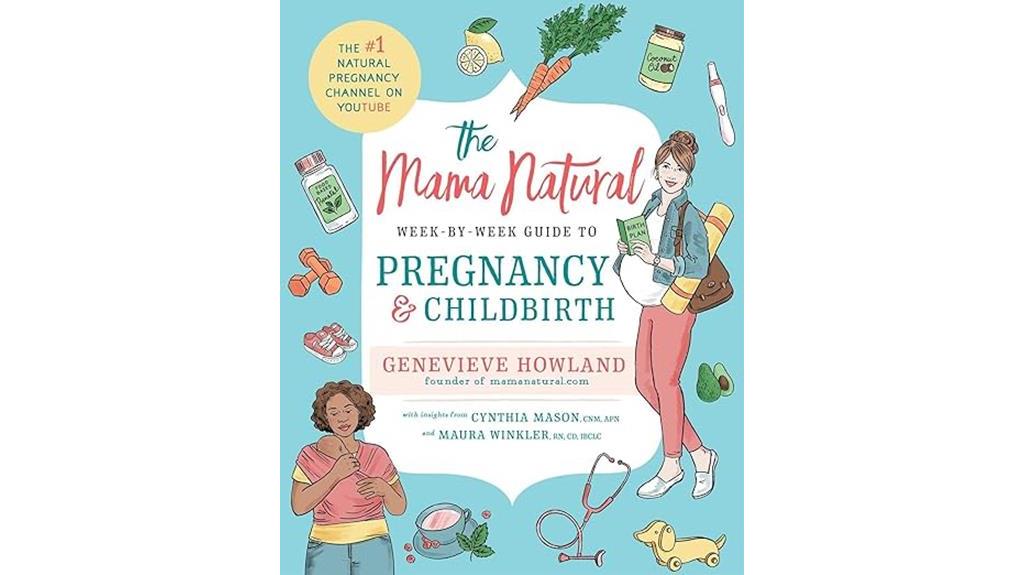
For those seeking a thorough and natural approach to pregnancy and childbirth, 'The Mama Natural Week-by-Week Guide' is an invaluable resource.
This detailed book breaks down essential information into easily digestible sections, covering everything from appointments and tests to exercises and healthy practices during pregnancy.
I appreciate the science-based research woven throughout the book, along with its beautiful illustrations that enhance understanding.
The week-by-week guide offers a unique perspective on pregnancy from a natural angle, making it a standout choice for expectant mothers.
Readers have shared positive experiences with the book, highlighting its practical tips, illustrations, and guidance on various aspects of pregnancy, labor, postpartum, and even pregnancy loss.
Whether you're a first-time mom or already experienced, this book emphasizes the importance of informed decision-making throughout your pregnancy journey.
Best For: Expectant mothers seeking a comprehensive and natural approach to pregnancy and childbirth.
Pros:
- Provides easily digestible information on various pregnancy-related topics.
- Offers practical tips, beautiful illustrations, and guidance for pregnancy, labor, and postpartum.
- Emphasizes informed decision-making and encourages a natural perspective on pregnancy.
Cons:
- Some readers have reported issues with printing errors and damaged copies.
- Minor concerns about the cost and appearance of the book.
- Quality feedback varies among readers.
Raising Good Humans: A Mindful Guide to Breaking the Cycle of Reactive Parenting
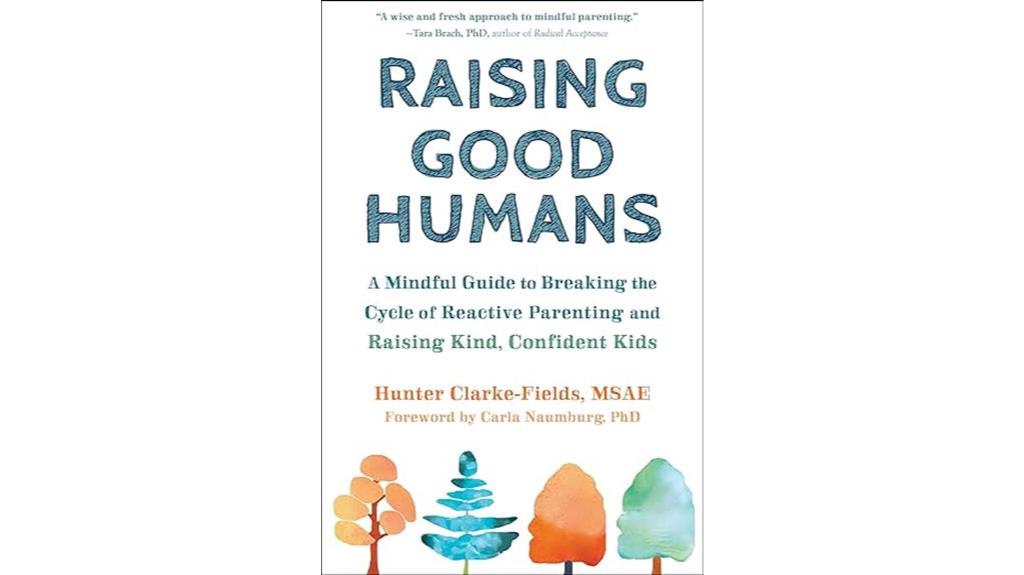
This insightful guide on breaking the cycle of reactive parenting is a valuable resource for parents seeking to enhance their approach to raising children mindfully. With positive reviews highlighting its helpfulness and engaging delivery, 'Raising Good Humans' has resonated with many readers, especially first-time parents.
The book's impact on parenting is evident, with readers mentioning a shift in their parenting style and the ability to navigate challenging moments with their children more effectively. While some readers faced challenges in unlearning past habits, the emphasis on self-work and mindfulness practices proved beneficial in their parenting journey.
Personal experiences shared by readers showcase the book's effectiveness in identifying triggers, promoting self-reflection, and ultimately, helping individuals become better parents. By emphasizing specific techniques like I language and mindfulness practices, this book equips parents with the tools to raise confident and emotionally resilient children.
Best For: Parents looking to break the cycle of reactive parenting and adopt a mindful approach to raising confident and resilient children.
Pros:
- Insightful and engaging delivery that resonates with readers.
- Effective strategies for handling difficult parenting moments.
- Emphasis on self-work and mindfulness practices for personal growth as a parent.
Cons:
- Some readers may find it challenging to unlearn past parenting habits.
- Initial difficulty in approaching mindfulness practices for a few readers.
- The emphasis on self-reflection and personal growth may require significant effort and commitment.
Natural Hospital Birth 2nd Edition: The Best of Both Worlds
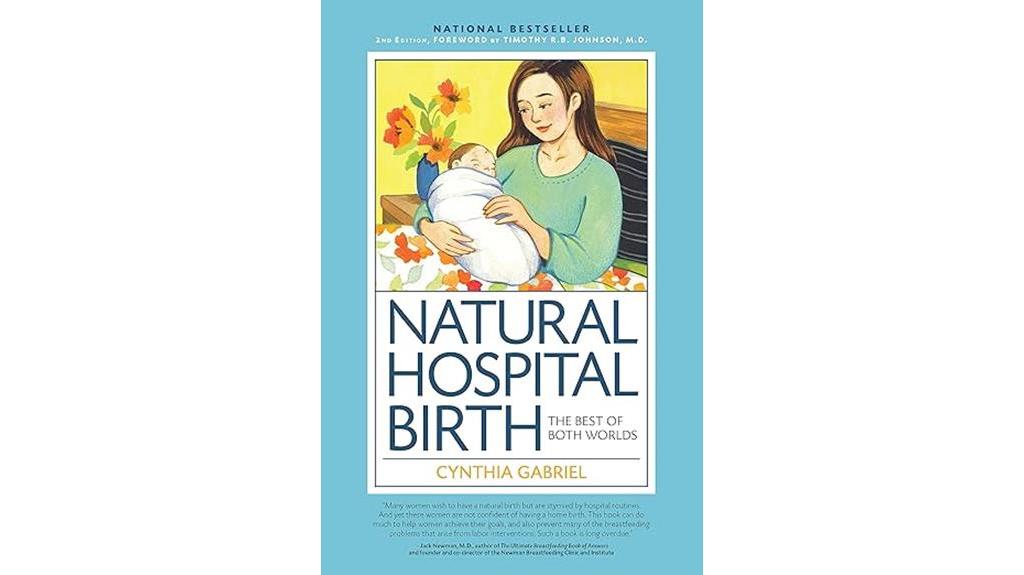
With its practical guidance and real-life accounts, 'Natural Hospital Birth 2nd Edition: The Best of Both Worlds' is an invaluable resource for expectant mothers seeking to prepare for unmedicated hospital births.
The book not only offers information on natural birthing techniques but also provides insights into maneuvering the hospital environment while aiming for a medication-free delivery.
Readers appreciate the unbiased approach taken by the author, which allows all birthing mothers to benefit from the book's content, regardless of their birth plan.
By sharing personal experiences and testimonials, the book instills confidence in women, empowering them to advocate for their preferences during childbirth.
'Natural Hospital Birth 2nd Edition' stands out for its practical advice, helping mothers create birth plans aligned with their desires and make informed decisions throughout the labor process.
Best For: Expectant mothers seeking to prepare for unmedicated hospital births and looking for unbiased, practical guidance.
Pros:
- Valuable information for preparing for unmedicated hospital births
- Real-life accounts and personal experiences shared
- Empowers women to make informed decisions and advocate for their preferences during childbirth
Cons:
- May not cater to those planning medicated births
- Limited focus on alternative birthing options outside of hospitals
- Some readers may find the content repetitive if already well-versed in natural birthing techniques
Your Childs Best Face: How To Nurture Top Health & Natural Glow
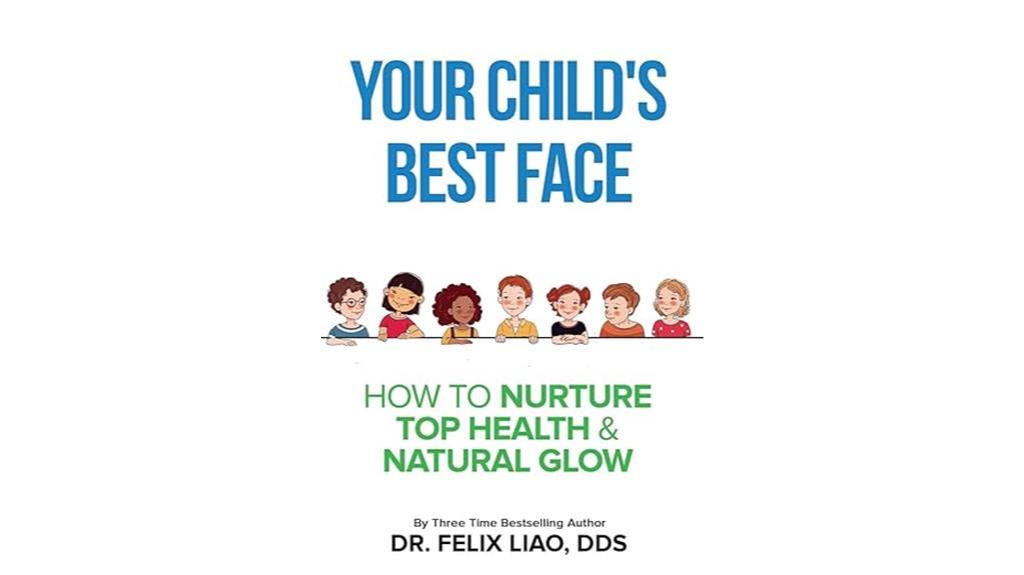
Exploring your child's top health and natural glow is made accessible through the insightful guidance provided in 'Your Child's Best Face,' a must-read for parents seeking to prioritize their child's overall well-being.
This book investigates the facial signs that can indicate underlying dental and systemic issues in children. It stresses the importance of early interventions to improve health outcomes.
In today's modern lifestyle, factors like diet and breathing habits can impact a child's facial development and overall health. 'Your Child's Best Face' offers practical solutions to reverse issues like mouth breathing and cavities, highlighting the link between facial symmetry and gut health.
With clear visuals and real-life cases, this book equips parents and dentists with the knowledge needed to address early signs of dental problems and promote their child's well-being.
Best For: Parents and dentists who want to understand the early signs of dental and systemic issues in children and learn how to improve their overall health outcomes.
Pros:
- Offers practical solutions to reverse issues like mouth breathing and cavities in children.
- Provides clear visuals and real-life cases to enhance understanding of facial development and health.
- Emphasizes the importance of early interventions for better physical and mental well-being in children.
Cons:
- Might require further professional consultation for specific individual cases.
- Some readers may find the technical dental terminology challenging to grasp.
- Not a quick-fix solution and requires consistent effort and follow-through.
The Nourishing Traditions Book of Baby & Child Care

For parents seeking a holistic approach to child-rearing rooted in traditional nutritional wisdom, 'The Nourishing Traditions Book of Baby & Child Care' offers an all-encompassing guide. This book explores the benefits of a traditional diet rich in grass-fed animal fats and proteins, contrasting it with conventional beliefs.
Drawing inspiration from Dr. Weston Price's research on traditional diets, it critiques mainstream dietary advice for babies and emphasizes the importance of animal fats in promoting healthy childbearing.
From pregnancy and nutrition guidelines to childbirth and newborn care advice, this book covers a wide array of topics. It also provides insights on infant care, feeding, child development, and nutrition, advocating for real foods and offering practical tips on parenting and toxin avoidance.
If you're looking to nurture your child's health through traditional nutritional practices, this book is a valuable resource.
Best For: Parents seeking a holistic and traditional approach to child-rearing through nutrition-focused practices.
Pros:
- Comprehensive coverage of traditional nutritional wisdom for raising healthy children.
- Emphasis on the importance of real foods and nutrients over conventional dietary advice.
- Practical tips and insights on pregnancy, childbirth, infant care, and child development.
Cons:
- May not align with mainstream dietary guidelines, potentially causing conflicting viewpoints.
- Emphasizes animal fats and proteins, which may not suit all dietary preferences.
- Some recommendations, such as homemade baby formulas, may require extra effort and preparation.
Mindful Birthing: Training the Mind, Body, and Heart for Childbirth and Beyond
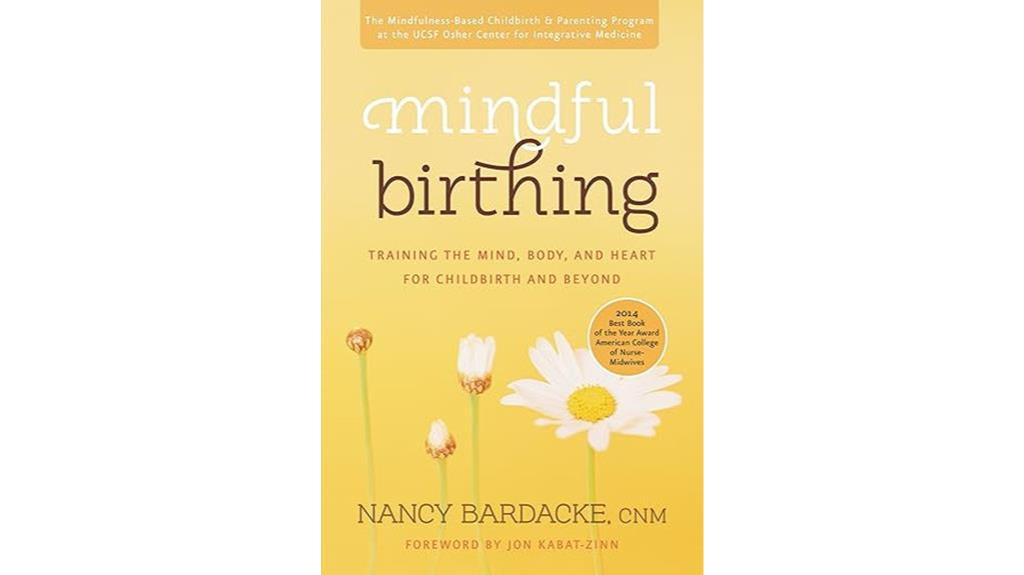
Readers seeking a thorough guide to incorporating mindfulness practices into their childbirth experience and beyond will find 'Mindful Birthing' a valuable resource.
This book has been praised for its ability to ease worries about childbirth and provide practical tools for labor and delivery. Many readers appreciated the holistic approach that 'Mindful Birthing' offers, finding the mindfulness techniques helpful in staying calm and in control during the birth process.
The non-judgmental stance of the book has also been well-received by individuals with different birth experiences. Highly recommended for expecting mothers and their partners, 'Mindful Birthing' has been found beneficial for various types of births, including medication-free births and VBACs.
Additionally, the book includes postpartum mindfulness techniques to help parents stay present and manage stress during the challenging early months of parenthood.
Best For: Expecting mothers and their partners seeking a mindful approach to childbirth and wanting practical tools for labor and delivery.
Pros:
- Provides practical tools for labor and delivery.
- Offers mindfulness techniques to stay calm and in control during childbirth.
- Includes postpartum mindfulness techniques for managing stress in the early months of parenthood.
Cons:
- May not resonate with individuals who prefer traditional childbirth approaches.
- Some readers may find the mindfulness techniques challenging to incorporate into their routine.
- The book's non-judgmental approach may not appeal to those seeking more prescriptive guidance.
The Natural Baby Sleep Solution

In addition to the practical approach offered by 'Natural Parenting Books for Parents' in improving infant sleep patterns through 'The Natural Baby Sleep Solution', this book has garnered positive testimonials. Parents have reported significant improvements in their baby's sleep routines, with some highlighting how the book helped a 10-month-old achieve uninterrupted sleep and reduced night awakenings.
The program's effectiveness was noticeable within just a few days of implementation, indicating quick results for sleep-deprived parents. Additionally, the book provides evidence-based information and valuable insights into recognizing signs of tiredness in babies, aiding in establishing better sleep habits.
While some feedback suggests a lack of tips for older infants, overall, the book's realistic expectations and user-friendly approach make it a valuable resource for parents seeking to enhance their baby's sleep quality.
Best For: Parents seeking evidence-based and practical guidance to improve their baby's sleep patterns efficiently.
Pros:
- Evidence-based information and clear insights for recognizing baby's tiredness cues.
- Quick results observed within a few days of implementing the program.
- Positive testimonials and recommendations from parents highlighting improved sleep quality.
Cons:
- Lack of practical tips specifically tailored for older babies.
- Realistic expectations may not fully address all sleep issues for every infant.
- Could benefit from more comprehensive guidance on sleep training techniques.
Nurture: A Modern Guide to Pregnancy, Birth, Early Motherhood
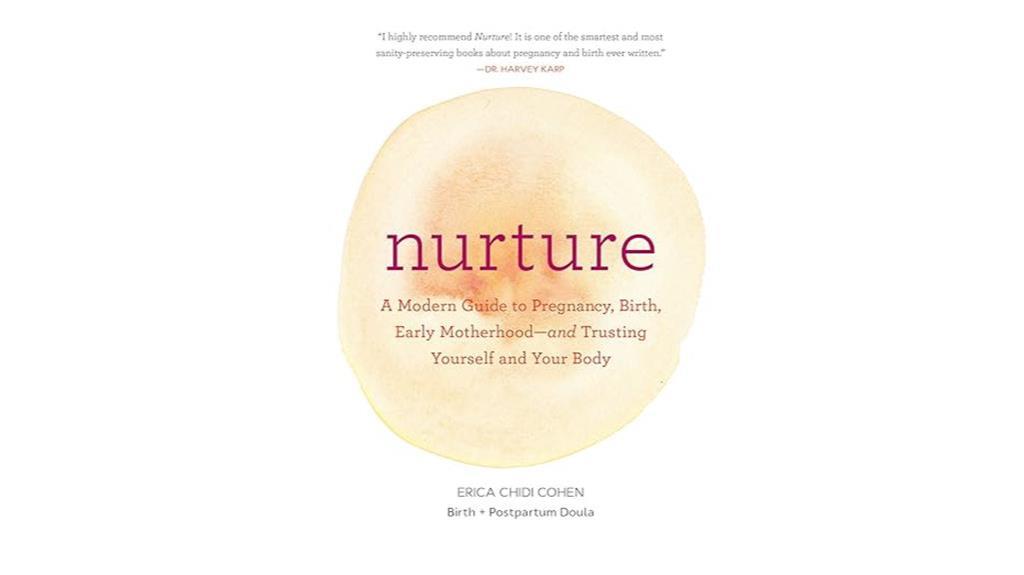
With its focus on holistic and natural birthing practices, 'Nurture: A Modern Guide to Pregnancy, Birth, Early Motherhood' is a valuable resource for expectant mothers seeking empowering and detailed information. The book encompasses various aspects of pregnancy, labor, birth, and postpartum care, offering thorough content ranging from baby development and body changes to breastfeeding and birth plans.
It provides practical advice on holistic birthing practices and includes month-by-month chapters addressing nutrition, exercises, and mental well-being. 'Nurture' also adds a personal touch by guiding readers through the emotional journey of pregnancy, encouraging trust in instincts, and offering relaxation techniques.
Despite some criticisms of basic or outdated information, the book remains educational, informative, and supportive, making it a beneficial read for expecting mothers looking for a blend of science and emotional support.
Best For: Expectant mothers who value holistic and natural birthing practices and seek a comprehensive guide for pregnancy, labor, and early motherhood.
Pros:
- Comprehensive coverage from pregnancy to postpartum, including baby development and birth plans.
- Personalized emotional support and encouragement for trusting instincts.
- Practical advice on holistic birthing practices and month-by-month guidance for well-being.
Cons:
- Some may find the information basic or outdated.
- Not universally applicable due to cultural differences.
- Mixed reviews on the scientific accuracy of the content.
Ina Mays Guide to Childbirth Updated With New Material
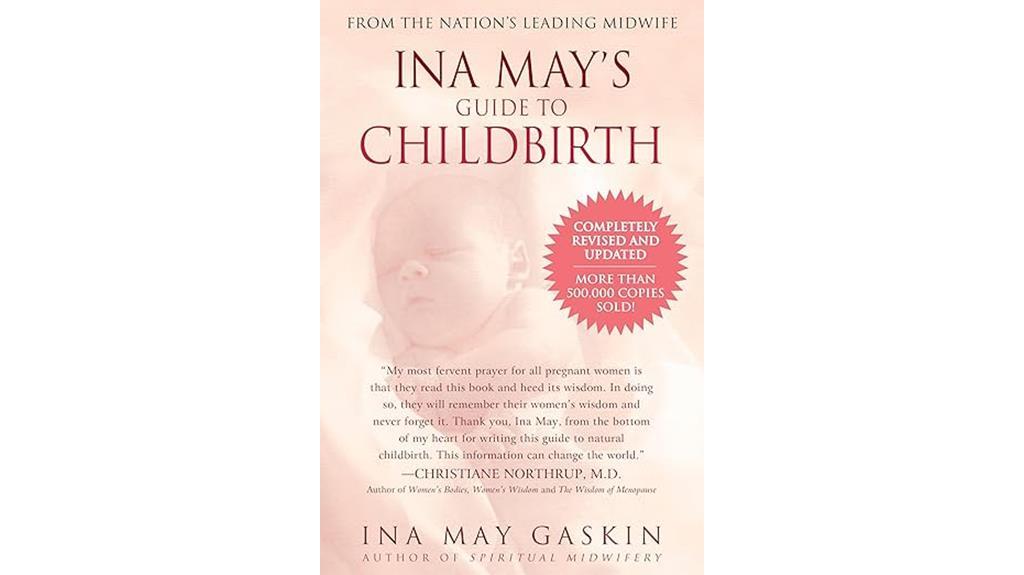
For parents seeking thorough guidance on natural childbirth experiences and empowerment, 'Ina May's Guide to Childbirth' with updated material is an invaluable resource. Ina May Gaskin, a renowned midwife, provides a wealth of knowledge and inspiration in this book.
The updated version includes new material that further enhances its relevance for expecting parents. Through empowering birth stories and practical advice, the book equips readers with confidence and understanding about the childbirth process.
It emphasizes the importance of informed decision-making and advocates for the natural birthing experience while also acknowledging the potential for medical interventions. Whether you're a first-time parent or looking to enhance your childbirth knowledge, 'Ina May's Guide to Childbirth' offers a detailed and insightful perspective that can positively impact your journey into parenthood.
Best For: Expecting parents seeking empowering birth stories, practical advice, and a deeper understanding of natural childbirth.
Pros:
- Provides empowering birth stories and practical advice.
- Equips readers with confidence and understanding about the childbirth process.
- Advocates for informed decision-making and natural birthing experiences.
Cons:
- May not fully address the complexity of medical interventions during childbirth.
- Some readers may find the emphasis on natural birth limiting in certain situations.
- Personal experiences shared may not resonate with all readers.
Breastfeeding Made Simple: Seven Natural Laws for Nursing Mothers
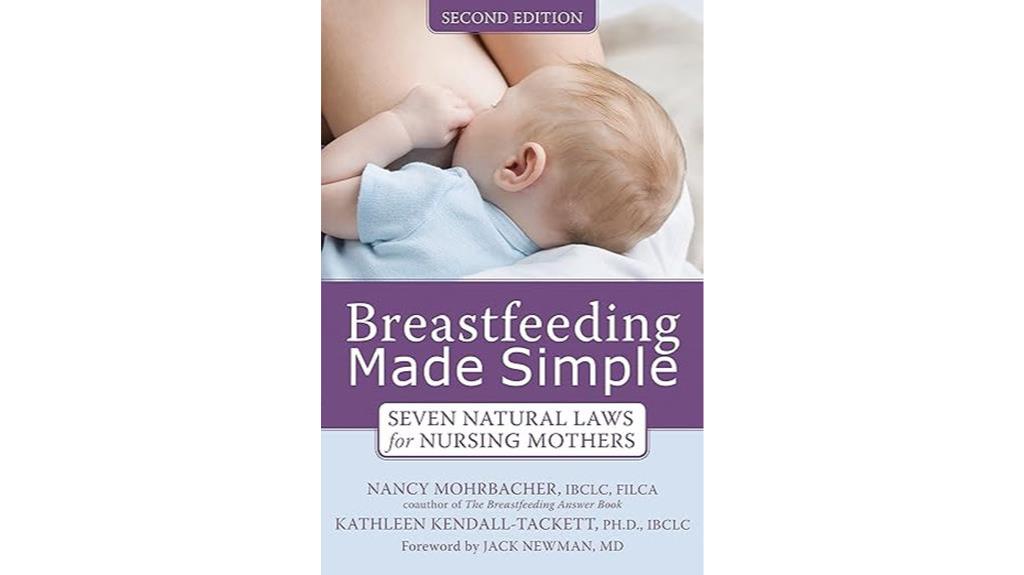
The book 'Breastfeeding Made Simple: Seven Natural Laws for Nursing Mothers' serves as an invaluable resource for first-time breastfeeding mothers looking for practical guidance and support. It offers a thorough guide to help mothers navigate the challenges and joys of breastfeeding.
Through personal experiences shared by other mothers, the book provides reassurance and practical tips on overcoming common breastfeeding obstacles. Reading this book before giving birth can better prepare mothers for the breastfeeding journey ahead.
It emphasizes the benefits of breastfeeding, both considering cost savings and the health advantages it offers to the baby. With explanations on milk supply, latch techniques, and addressing breastfeeding issues, this book equips mothers with the knowledge needed for successful nursing.
Best For: First-time breastfeeding mothers seeking practical guidance and support for overcoming common breastfeeding challenges and achieving successful nursing.
Pros:
- Comprehensive guide offering practical tips and insights from real experiences of other mothers.
- Emphasis on the benefits of breastfeeding and cost savings associated with it.
- Structured content covering essential topics like milk supply, latch techniques, and addressing breastfeeding issues.
Cons:
- May not cater to experienced breastfeeding mothers looking for more advanced techniques or information.
- Some readers may find the content repetitive if they have already gathered similar information from other sources.
- Limited focus on specific medical conditions or complications that may arise during breastfeeding.
The Best Homemade Baby Food on the Planet
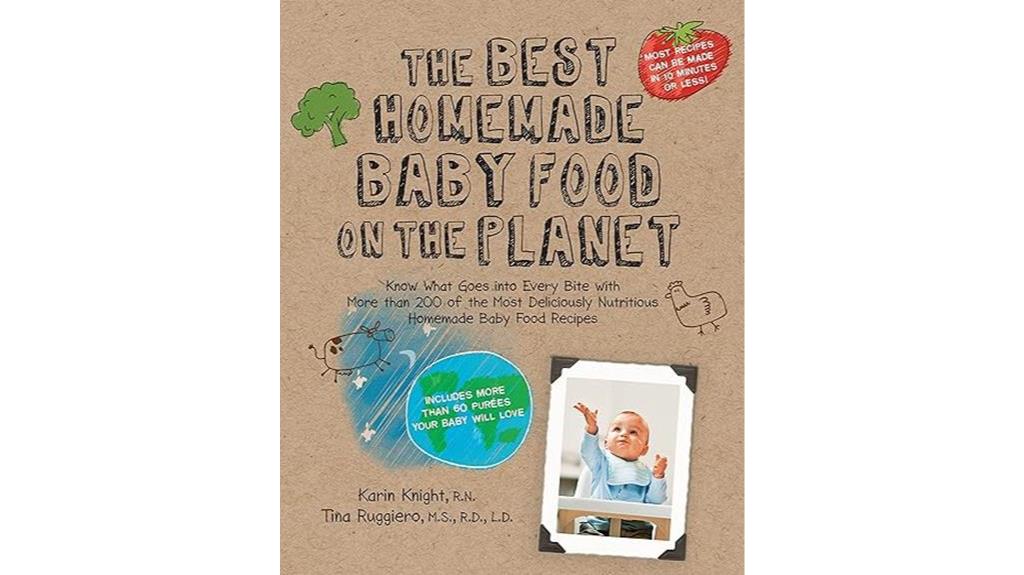
Containing a variety of creative and nutritious recipes, this book is a must-have for parents seeking to provide their babies and toddlers with wholesome homemade meals. With a clear layout and easy-to-follow instructions, it offers a range of healthy options that are quick to prepare, making mealtime a breeze for busy parents.
The incorporation of nutrient-dense foods and age-appropriate recipes guarantees that little ones receive the essential nutrition they need to thrive. Endorsed by a Registered Dietitian, this book emphasizes the significance of good nutrition for young children and provides valuable insights for parents guiding the world of homemade baby food.
From introducing foods based on age to freezer-friendly options and storage tips, this book equips parents with practical information to support their child's healthy eating journey.
Best For: Parents looking for a comprehensive guide to preparing creative and nutritious homemade meals for their babies and toddlers.
Pros:
- Well laid out with clear instructions.
- Variety of creative and healthy recipes.
- Includes practical information and tips for parents.
Cons:
- Some concerns raised about breastfeeding information.
- Desire for more diverse recipes beyond purees.
- Limited ideas catering to older babies.
Gentle Birth, Gentle Mothering: A Doctor's Guide to Natural Childbirth and Gentle Early Parenting Choices
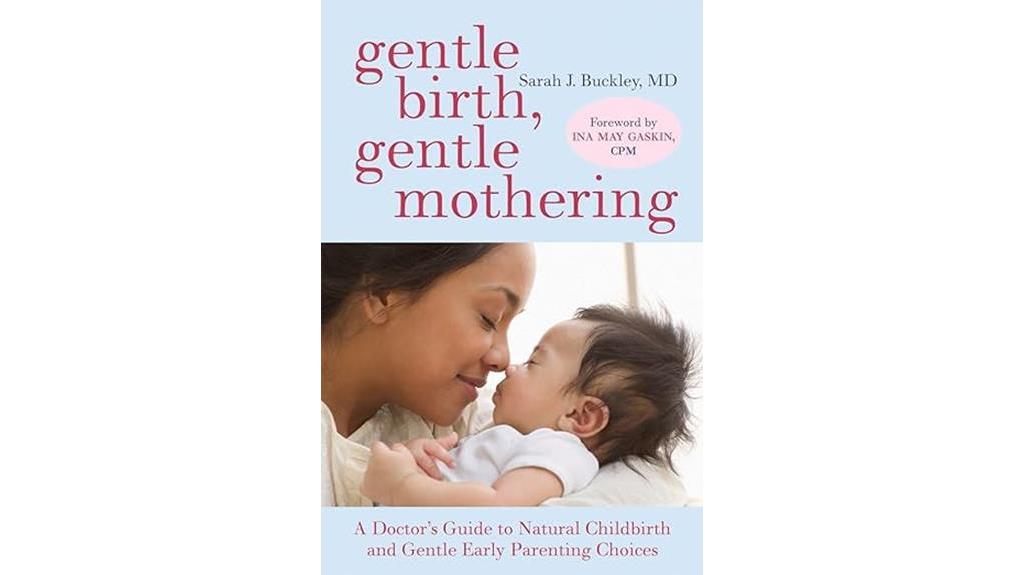
Highly recommended for those seeking evidence-based guidance on natural childbirth and early parenting choices, 'Gentle Birth, Gentle Mothering' empowers individuals to make informed decisions during their pregnancy journey.
Dr. Sarah Buckley's book advocates for undisturbed birth and gentle early parenting choices, presenting research against interventions like ultrasound and epidurals while emphasizing the benefits of skin-to-skin contact and breastfeeding.
The well-rounded mix of scientific facts and personal experiences encourages readers to explore birth options with an open mind. While some critics find the book too focused on natural birth, many appreciate the confidence it instills during labor.
Overall, 'Gentle Birth, Gentle Mothering' offers a thorough look at childbirth choices, helping readers navigate the journey with autonomy and informed decision-making.
Best For: Expectant mothers and individuals seeking evidence-based information and empowerment in natural childbirth and early parenting choices.
Pros:
- Research-based information advocating for undisturbed birth and gentle early parenting choices.
- Emphasis on benefits of skin-to-skin contact, co-sleeping, and breastfeeding supported by scientific evidence.
- Encourages informed decision-making in childbirth with a blend of personal experiences and research.
Cons:
- Some readers may find the book's emphasis on natural birth overwhelming or biased.
- Criticisms include a perceived negativity towards medical interventions rather than a balanced view.
- The book may trigger defensiveness or fear of medical interventions for some readers.
Smart Medicine for a Healthier Child

For parents seeking a thorough guide to childhood health remedies, 'Smart Medicine for a Healthier Child' is an invaluable resource. This book offers detailed information on a wide range of treatments for childhood maladies, providing parents with a thorough, effective, and helpful approach to managing their child's health.
It covers allopathic, herbal, homeopathic, and natural remedies in an easy-to-reference alphabetical layout. With a section dedicated to when to call the doctor, it offers valuable guidance in emergency situations. Users praise its extensive approach, practicality, and usefulness in addressing common and uncommon childhood illnesses.
Recommended by parents, birth assistants, and doulas, this book's versatility in providing nutritional, homeopathic, and herbal suggestions makes it a must-have for all parents looking to empower themselves in their child's health management.
Best For: Parents and caregivers looking for a comprehensive guide to managing their child's health through a variety of treatment options.
Pros:
- Provides detailed information on allopathic, herbal, homeopathic, and natural remedies.
- Alphabetical layout for easy reference.
- Includes guidance on when to seek medical help in emergency situations.
Cons:
- May be overwhelming for some users due to the extensive information provided.
- Could benefit from more specific dosage and administration guidelines.
- Limited focus on preventive measures for maintaining children's health.
Thriving with ADHD: A Guide to Naturally Reducing ADHD Symptoms in Your Child
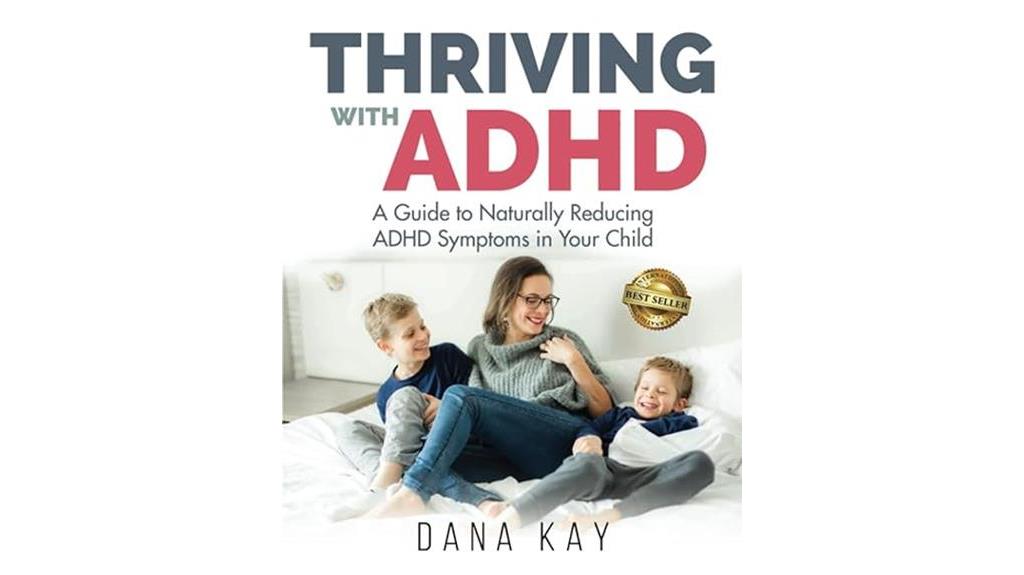
The guide 'Thriving with ADHD: A Guide to Naturally Reducing ADHD Symptoms in Your Child' is a valuable resource for parents seeking holistic strategies to support their child's well-being. Parents who've used the book found it practical, easy to follow, and filled with actionable steps. It serves as an excellent starting point for implementing natural approaches to address ADHD symptoms in children.
The book's holistic perspective, including advice on dietary and lifestyle changes, has been well-received by testimonials. Professionals, like integrative medicine physicians, have praised the impactful solutions presented in the book, emphasizing the importance of finding lasting remedies for children with challenging behaviors.
Readers appreciate the alternative treatment options beyond medication, finding hope in the possibility of their children thriving through healthy and natural methods. The book offers gratitude and inspiration, making it a recommended read for parents looking to understand and address ADHD symptoms from a holistic viewpoint.
Best For: Parents seeking natural and holistic strategies to help their children manage ADHD symptoms effectively.
Pros:
- Practical, easy-to-understand guide with actionable steps.
- Offers holistic approach including dietary and lifestyle recommendations.
- Provides hope and inspiration for parents looking for alternative treatments beyond medication.
Cons:
- May require significant time and effort to implement dietary and lifestyle changes.
- Individual results may vary in terms of symptom improvement.
- Some readers may prefer more in-depth scientific explanations on the strategies suggested.
The Simplest Pregnancy Book in the World
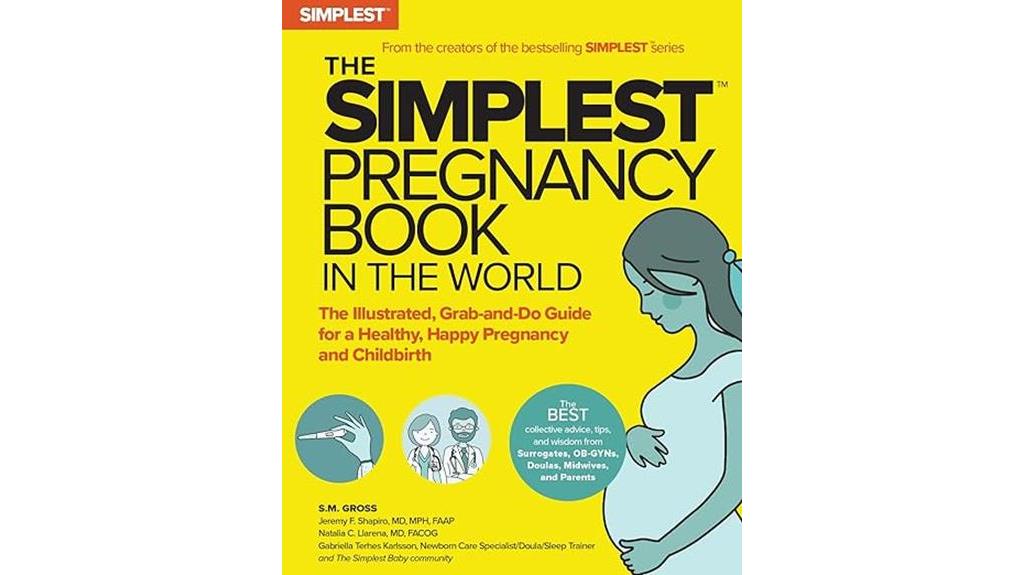
With its practical and informative approach, 'The Simplest Pregnancy Book in the World' is a must-have for expectant moms seeking a straightforward guide to pregnancy and childbirth. This book has garnered positive reviews for its ability to ease fears and provide answers to common questions expectant mothers may have.
It covers a wide range of topics related to pregnancy and childbirth, helping readers prepare for labor and find suitable resources. The information presented is detailed yet concise, making it easy to traverse and understand.
Whether you're a first-time mom or experienced in parenthood, this book offers honest facts, helpful hacks, and practical tips for each trimester and post-birth care. Written in a simple and accessible manner, 'The Simplest Pregnancy Book in the World' is organized for easy reading, making it a valuable resource for journeying through the experience of pregnancy and parenthood.
Best For: First-time and experienced moms looking for a practical and informative guide to pregnancy and childbirth.
Pros:
- Practical, simple, and informative approach.
- Eases fears and answers common questions for expectant moms.
- Useful information presented in a detailed yet concise manner.
Cons:
- May lack in-depth coverage on certain specific topics.
- Some readers may prefer more visual aids or illustrations.
- Limited focus on postpartum mental health and emotional well-being.
Factors to Consider When Choosing Natural Parenting Books

When selecting natural parenting books, it's crucial to take into account criteria such as the author's credibility, the relevance of the content to your parenting style, and the inclusion of practical tips.
Ensuring the book balances modern practices with natural approaches can provide a well-rounded perspective on parenting techniques.
Criteria for Selecting Books
Consideration of the author's credentials and expertise in natural parenting is essential when selecting books on the subject. Making sure that the author has a solid background in natural parenting practices can help guarantee that the information provided is reliable and trustworthy.
Look for books that not only offer practical tips but also present evidence-based research and actionable advice for implementing natural parenting methods effectively. It's beneficial to choose a book that covers a wide range of topics related to pregnancy, childbirth, breastfeeding, and child development to get a thorough understanding of natural parenting.
Additionally, prioritize books that align with your parenting philosophy and values to ensure that the content resonates with your approach. Selecting a book that provides guidance on incorporating natural remedies, holistic practices, and healthy lifestyle choices for raising children can further support your natural parenting journey.
Author Credibility Importance
To ensure the reliability and trustworthiness of information in natural parenting books, it's essential to carefully assess the credibility of the authors behind the content.
When selecting a natural parenting book, consider authors with backgrounds in fields like pediatrics, child psychology, nutrition, or holistic health. Authors who are experienced practitioners, researchers, or educators in natural parenting can offer valuable insights and evidence-based advice.
Look for authors with a strong reputation in the natural parenting community or those who've published well-regarded works in the field. Checking for endorsements, reviews, or recommendations from reputable sources or experts in natural parenting can help gauge the author's credibility.
Authors with relevant qualifications, experience, and expertise in natural parenting increase the credibility of the content they provide. Additionally, authors who've conducted research, published studies, or have a background in child development are more likely to offer valuable insights in their books.
Consider the author's reputation and track record in the natural parenting space to align their perspectives with your values and beliefs.
Relevance to Parenting Style
Understanding how a natural parenting book resonates with my personal parenting philosophy and values is vital when selecting reading material for guidance and insights. It's essential to assess whether the book aligns with my parenting style, whether it's attachment parenting, gentle parenting, or holistic parenting.
By choosing a book that mirrors my approach, I can better integrate the strategies and techniques suggested within its pages. Additionally, evaluating if the book addresses specific challenges I face in my parenting journey is paramount. It's important to make sure that the book's natural parenting approach is evidence-based and backed by research, providing a solid foundation for its recommendations.
Selecting a book that offers practical advice and strategies that can be easily implemented into my daily routines is advantageous. By focusing on my parenting style, concerns, and interests, I can find a natural parenting book that resonates with me and provides valuable insights tailored to my individual needs.
Inclusion of Practical Tips
How can natural parenting books enrich my journey as a parent by providing practical tips for implementing holistic parenting practices effectively and efficiently?
Natural parenting books offer valuable insights into incorporating holistic parenting methods into daily routines. When choosing a book, look for practical tips on breastfeeding, babywearing, natural remedies, and more. Seek step-by-step guidance on creating natural birth plans, making baby food, and practicing mindfulness techniques.
Opt for books with hands-on activities to help you apply these methods in real-life situations. It's beneficial to have real-life examples and case studies to understand how these practices work in different scenarios. Additionally, books should provide resources and references for further exploration. Practical advice supported by scientific evidence ensures safety and effectiveness.
Choose books with manageable tips that suit your busy lifestyle. By incorporating practical tips from natural parenting books, you can navigate the challenges of holistic parenting with confidence and ease.
Balancing Modern Practices
When selecting natural parenting books, it's important to examine how they strike a balance between modern medical practices and traditional or holistic approaches. Look for books that offer a well-rounded view of modern parenting challenges while advocating for natural solutions.
Consider how the books address the integration of modern technology and natural parenting methods. Evaluate if the books provide evidence-based information on the effectiveness of natural parenting techniques in a modern context. Assess whether the books offer practical tips and strategies for incorporating natural parenting principles into a modern lifestyle.
Also, consider how the book balances modern parenting practices with natural and holistic approaches. Look for information on integrating traditional wisdom with contemporary research and recommendations. Evaluate the book's approach to incorporating modern tools and technologies while staying true to natural parenting principles.
Check if the book addresses the challenges of navigating modern lifestyles while prioritizing natural and sustainable parenting choices. Make sure the book offers practical tips and strategies for implementing natural parenting in a modern world.
Research-Backed Information
To make informed choices when selecting natural parenting books, consider prioritizing those that present research-backed information supported by scientific studies and evidence. Look for books that cite reputable sources and studies to guarantee the information provided is reliable and accurate.
It's crucial to choose books that offer a balanced view of natural parenting methods, incorporating both traditional wisdom and modern research findings. Books that emphasize evidence-based practices and recommendations for raising children in a healthy and holistic manner can provide valuable insights.
Additionally, seek out books that emphasize the importance of informed decision-making based on scientific evidence when it comes to natural parenting choices. By selecting books that provide evidence-based information supported by scientific research on natural parenting practices, you can equip yourself with the knowledge needed to make informed decisions for your child's well-being.
Prioritizing research-backed information can help you navigate the vast array of natural parenting advice available and choose strategies based on proven research.
User-Friendly Layout
Consider selecting natural parenting books that feature a user-friendly layout, incorporating clear headings, bullet points, and diagrams to enhance comprehension and ease of navigation. A well-organized book can make it easier to find information quickly and follow the content effectively.
Look for books that break down complex concepts into manageable sections, offering a structured and organized reading experience. Check for clear headings and subheadings that guide you through the content seamlessly.
Opt for books with a consistent format, using bullet points, lists, and summaries to aid in understanding and retention of information. Additionally, a visually appealing layout with illustrations, charts, and diagrams can enhance your comprehension of challenging topics.
Make sure the book includes a table of contents, index, and glossary for easy access to specific topics and terms. By choosing a natural parenting book with a user-friendly layout, you can enhance your reading experience and benefit from a well-structured resource.
Engaging Visual Elements
Exploring natural parenting books involves seeking out those that incorporate engaging visual elements to enhance understanding and retention of information. Visual aids like illustrations, diagrams, and charts play an important role in simplifying complex concepts, making them more accessible and enjoyable to learn.
For instance, illustrations depicting parenting techniques or exercises can clarify instructions, aiding in easier implementation. Additionally, visual representations of data and statistics help readers grasp key points effectively, enabling them to make informed decisions. Books with visually appealing layouts and designs not only enhance the reading experience but also keep readers engaged throughout the content.
Colorful and well-designed graphics not only make the information more appealing but also aid in retention. By breaking up text-heavy sections and incorporating photographs and infographics, natural parenting books cater to various learning styles, ensuring active engagement with the content. Essentially, engaging visual elements are essential in making natural parenting books informative, interactive, and visually stimulating.
Frequently Asked Questions
Can Natural Parenting Books Help With ADHD Symptoms in Children?
Yes, natural parenting books can provide strategies and insights on supporting children with ADHD symptoms. These books often offer holistic approaches, such as nutrition, mindfulness, and positive discipline techniques, which can complement traditional treatment methods.
Understanding how lifestyle factors can impact ADHD symptoms may help parents better navigate their child's challenges. While not a replacement for professional medical advice, these resources can be valuable tools in managing ADHD in children.
How Can I Choose the Best Natural Parenting Book for My Family?
To choose the best natural parenting book for my family, I consider our specific needs and values. Researching authors and their expertise in natural parenting is essential. Reading reviews from other parents can provide valuable insights.
I also look for books that align with my parenting style and goals. Checking for up-to-date information and practical advice guarantees relevance.
Ultimately, selecting a book that resonates with me personally is key to finding the best fit for my family.
What Are Some Key Factors to Consider When Selecting a Natural Parenting Book?
When choosing a natural parenting book, consider the author's credentials, ensuring they have expertise in child development.
Look for a book that aligns with your parenting philosophy and addresses your specific concerns.
Check reviews for insights on readability and practicality.
Assess the book's organization and layout to see if it suits your learning style.
Lastly, opt for updated editions to access the latest research and recommendations.
These factors can guide you to the right natural parenting book for your family.
Do These Books Address Common Breastfeeding Challenges for New Mothers?
When it comes to addressing common breastfeeding challenges for new mothers, natural parenting books often provide valuable insights and practical tips.
These books typically cover topics such as latching issues, low milk supply, engorgement, and mastitis. They offer guidance on proper breastfeeding techniques, troubleshooting problems, and seeking professional support when needed.
Are There Specific Tips for Promoting Natural Sleep Solutions for Babies?
When it comes to promoting natural sleep solutions for babies, establishing a consistent bedtime routine can work wonders.
Incorporating soothing activities like gentle massages or lullabies can signal to your little one that it's time to wind down.
Additionally, creating a calm sleep environment with minimal distractions can help encourage peaceful slumber.
Are Natural Parenting Techniques Suitable for Raising Tweens?
Many parents find it challenging to navigate the tween years. Fortunately, there are numerous best parenting books for tweens that offer valuable insights into natural parenting techniques. By incorporating gentle discipline and open communication, parents can create a supportive and nurturing environment for their tweens to thrive.
Conclusion
As you explore the world of natural parenting, let these books be your guiding light, illuminating the path with wisdom and knowledge.
With each exploration of the page, you'll find yourself empowered to nurture your child with love and intention, creating a bond that will last a lifetime.
So immerse yourself in these insightful reads, and watch as your journey as a parent blossoms into something truly beautiful and fulfilling.
-

 Parenting Styles1 week ago
Parenting Styles1 week agoWorst Parenting Style: Impact on Child Development
-
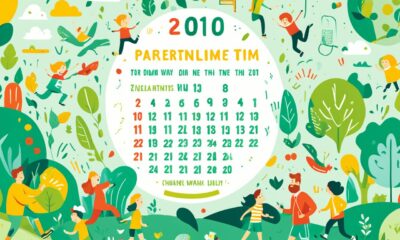
 Parenting Styles1 week ago
Parenting Styles1 week ago2023 Indiana Parenting Time Guidelines Update
-

 Vetted7 days ago
Vetted7 days ago15 Best Books on Step Parenting Every Blended Family Needs to Read
-

 Parenting Tips6 days ago
Parenting Tips6 days agoUnequal Responsibilities: When One Parent Does All the Parenting
-

 Parenting Tips1 week ago
Parenting Tips1 week agoFostering Love: How Much Do You Get Paid for Foster Parenting?
-

 Vetted6 days ago
Vetted6 days ago15 Best Parenting Books of All Time Every Parent Should Read
-

 Vetted23 hours ago
Vetted23 hours ago15 Best Co-Parenting Books Every Parent Should Read for Successful Co-Parenting
-

 Vetted6 days ago
Vetted6 days ago15 Best Books for Gentle Parenting Every Parent Should Read
